#I hate the new era of internet where fans are on the same networks as celebrities
Text
ryan reynolds is one of the better options for a celebrity on tumblr since he’s more likely to be normal about the bizarre fan content this website is built on but so help me GOD if any other mainstream celebrities come here I don’t know how I’m going to cope
#the whole POINT of tumblr is that this is a place celebrities don’t come#I hate the new era of internet where fans are on the same networks as celebrities#if they want to come into fan spaces then fine they’re welcome to do so#but the total lack of boundary between fan and celebrity is. disturbing#I don’t even like people knowing my name in real life#why would I want a real person knowing I wrote fiction about a character they play getting down and dirty#ryan reynolds
1K notes
·
View notes
Text
SEGA and the eternal issue of the Sonic-Amy dynamic

[Translator’s note: here’s the original article written by @latin-dr-robotnik, originally written on the 26th of August 2018]
While the Bowsette phenomenon shattered the internet into a thousand pieces, it seems like the Sonic fandom is splitting itself over a completely different matter: the eternal discussion over Sonic and Amy’s dynamic, and how much it can be considered official from SEGA’s perspective.
Note: this article ended up becoming the first part of a trilogy. Stay tuned for the next two parts!
The main culprit of this new chapter of the discourse is, believe it or not, the official SEGA Shop.
Emi Jones (I don’t need to introduce her, most people in the fandom know her) brought the attention on the description of one of the new clothing pieces that appeared in the shop for Amy’s 25th birthday, which essentially invited us to “celebrate 25 years of Sonic the Hedgehog’s girlfriend”. This short sentence generated a chain reaction in the fandom, both positive and negative, and it brought to the light once again the eternal question: is it really possible that they’re actually a couple? What is the official position of SEGA about this? There are good arguments for both sides.


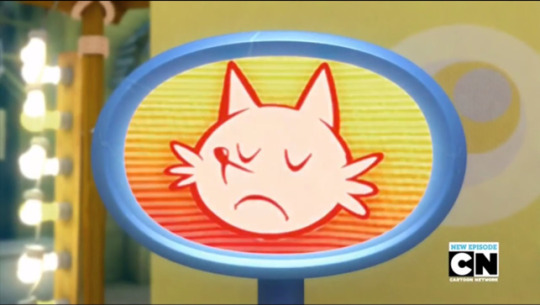
Eggman: If you fight my robot, we’ll be disqualified and you’ll never win that couch for that whiny little girlfriend of yours.
Sonic: SHE’S NOT MY GIRLFRIEND!
*wrong answer noise*
Sonic Boom – S1E41
First and foremost, who is Amy?
Note: the article is based on Cutegirlmayra’s research in different magazines, in the games’ canon, in the differences between Japan and the West, in the structure of the relationship, and in SEGA’s marketing.
Note 2: while there will be mentions of other medias such as comics and TV series, this article will explicitly focus on the dynamic between Sonic and Amy in their official Modern versions, that is, from the videogames.
Since her official conception in Sonic CD, Amy has simply been considered our blue hedgehog’s girlfriend without any issue, but Sonic Team looked for a way to make this common cliché a little different. So a “unique” dynamic was established between them: Amy is the one chasing Sonic, Sonic tries to avoid her explicit affection, but despite this they are destined together, both in the proper canon (according to Amy’s tarot cards the two are made for each other) and outside of it (SEGA’s directives). This means that their dynamic is written in an implicit manner, and it’s never clear if Sonic wants to flee to a different galaxy to get away from Amy or if he wants to stay with her forever. Officially, there have been signs both in favor and against it, and the rest is normally left to the interpretations of the fans. Nevertheless, SEGA of Japan and SEGA of America (with the complicity of Europe) have radically different ways of dealing with the Sonamy dynamic.

Sonamy in Japan
The relationship between Sonic and Amy, with its twists and turns, is deeply rooted into the Japanese culture of the ‘90s. According with the material found by Cutegirlmayra, Sonic and Amy are a couple in Japan, no doubt about it. This simple vision is due to how the Adventure era games were written: Sonic is much more gentle and subtle with Amy, to the point that there is a clear difference in tone in the Adventure 2 scene when Sonic, about to be sent off into space in a capsule, tells Amy to take care of herself. Japan didn’t have this vision of an openly hostile Sonic or of a totally-obsessed-to-the-point-of-violence Amy, in their culture and in the game scripts everything is much more serene and acceptable. At the same time, the situation is kept under control thanks to the mandates that SEGA strictly enforces over how to write the characters: for example, one of the most infamous ones is “Sonic can’t explicitly show affection to Amy Rose”. This kind of control allows SEGA of Japan to avoid problems like the ones in the West.
Then we have Sonic Channel, the official Japanese website for information and art, where once in a while events about Sonic and Amy take place, with fans sending their fanart of the official couple.
And finally, we can’t forget Sonic X, that, despite not being part of the official game canon, clearly shows the agenda of SEGA of Japan and Sonic Team for the two characters: dozens of scenes that imply something more, many songs about love/lovers and, well, everything about the famous Episode 52 ending.

Sonamy in the West.
In the West things became more complicated. On one hand, the West came to know Sally Acorn before Amy, and the way they presented the Sonic/Sally relationship was, without any doubt, much healthier in SatAM than, for example, Sonic/Amy in Adventure (note: I purposefully won’t mention Archie Sonic here). At the same time, the differences in translation of the original Japanese scripts, and the cultural differences between these two countries on opposite sides of the world, radically changed the personalities of both characters, giving us the infamous “hysterical fan” Amy in Adventure and Heroes, the one who chases Sonic to force him to marry her. The general public’s perception quickly opposed these attitudes, seeing that they could be potentially toxic and that they undermine the very nature of Sonic. Sonic X did little to help in the West due to the strong censorship process it received when translated from Japanese to English. By 2006 the damage was done, and subsequent attempts to modify Amy’s personality, so that she was not as effusive with Sonic, have been tried over the last decade to repair their dynamics, with a little help from Sonic Boom (where the dynamic is so well written that, in the penultimate episode of season 2, Sonic literally stops racing Tails and Knuckles at Amy’s request to go buy ingredients for the cake he was making - Modern Sonic wouldn’t do that in a thousand years) and from the direction Ian Flynn has been taking the comics he’s been involved in. SEGA’s mandates were applied in the West as well, but relatively late and as a consequence of some things that were slipping out of control, like Archie Sonic. Both Flynn and the writers of Sonic Boom had to find new ways to present the characters, adjusted to both Western cultural patterns and also to the mandates of a Japanese company. Anyway, thanks to the recent accomplishments, we can deduce that the rigid structure of the official mandates is going through some changes that could mean a new agenda from SEGA to represent the Sonamy dynamic.
All of this information leaves us with the last question, that brings us back to the topic of this article and concludes it:

Could Sonamy work today?
In the last 5 years we’ve seen a series of important transformations, both in the way Amy sees the world, her responsibilities and Sonic (ex: Sonic Lost World), and in the way Sonic himself treats Amy. Sonic Forces took some pages from Boom’s book when it came to their personalities, and it seems to be the beginning of a new era, made explicit by that description appeared in the SEGA Shop that sparked today’s discussion.
In 25 years, we’ve seen Amy chasing Sonic all over the world, living a life of adventures that contradicts her dreams of a stable life and a marriage, according to her declarations in games like Adventure. At the same time, Sonic never stopped seeking adventures all over the world, both alone and with his friends, of which he became the protector, including Amy. For the Sonamy dynamic to work today, I think the most obvious solution would be for the two of them to go on adventures together. How we see love has changed a lot in the span of 25 years, and Sonic and Amy would fit well the modern stereotype of those couples that travel all over the world to find adventures, and that we see in those posts labeled “Relationship goals”; at the end of the day, Sonic and Amy are this, stereotypes that follow a certain pattern. What’s more, such a relationship can still be kept subtle and true to official mandates if we add the rest of Team Sonic to the equation, which is basically what Sonic Boom did.
No need for kisses, no need for grandiose love declarations, weddings, or forming a family. All of this would even be extremely out of character for Sonic, and I’d hate for something like this to happen. Team Sonic is the only family he needs, and the Sonamy dynamic could benefit from the adventures, the anecdotes and the moments they spend together. A race at sunset, the view of a mountain, defeating a giant robot together… that’s how I would see a canonical relationship possible, and indeed I’m not the only one who sees it that way - remember IDW Sonic #2? [Translator’s note: the article is in Spanish and outdated]
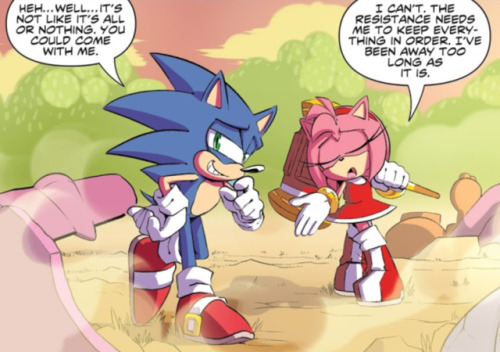
And let’s not forget about this scene from IDW Sonic #2: Sonic tells Amy that she can come on an adventure with him, but Amy refuses Sonic’s offer because of her responsibilities. Small changes like these have the potential to be slowly integrated into the official canon, and we have already seen how in Forces Amy barely bothers Sonic with her feelings.
So, when the eternal question of whether or not Sonic and Amy would work as a couple comes up again, you can say, yes! Yes, it can work without Sonic having to sacrifice his freedom, or Amy her dreams! The current context is making way for this, and while I may not think this whole SEGA store thing was completely intentional to drive the fandom crazy, I do think it’s time to start accepting the validity and potential of the couple. At the end of the day, everyone will ship what they want anyway, and that’s perfect. It will sound cliché, but remember that phrase that always circulates on social networks: "There are best friends who look like a couple, and couples who look like best friends."
#sonic the hedgehog#amy rose#sonamy#translation#analysis#personal comment: i disagree very much that amy in adventure was as crazy as she was in heroes#i think it was much more balanced and she had her shiny moments#but not my place to change the original words :P#also the bowsette joke immediately dates this article lol
189 notes
·
View notes
Text
Luke Novitske
English 102-06
Instructor: Jill Sumstad
10/4/20
Commentary Essay
Does Social Media Cause Division?
(Believing/Doubting)
Social media plays a bigger role in politics, race relations, and society now than it ever has before. Some people will debate that these effects are negative and others believe they are positive. The way the media runs nowadays, news can spread like wildfire, and everybody owns technology so they have access to all of the information. There are both advantages and disadvantages to anybody being able to put anything they want out to the public in a blink of an eye. Many sources will tell that social media creates a divide between Republicans and Democrats and only provides them with a larger platform to hash out their differences. Other sources argue that technology allows us the ability to speak our minds to greater crowds which is healthy for society.
Living in the year 2020, we tend to see a lot of negativity in the media which makes it hard to stay positive. It seems that whenever you turn on the TV to Fox News or CNN, all you see is Republicans and Democrats bashing each other. This creates the idea that the media is using its popular platform to cause a divide in society. When I scroll through my social media feed nowadays, I see a lot of hate being exchanged between the two main political parties, “Another trend on experts’ minds is how the algorithms behind these massively influential social media platforms may contribute to the rise of extremism and hate online,” (Social Media’s Impact on Society). Currently, millions of Americans are preparing for November 3rd to vote for either Joe Biden or President Donald Trump. After the political debates my mom and I flipped back and forth between CNN and Fox News. On CNN, we didn’t hear one good thing about Donald Trump, so based on the news that they are telling their viewers Donald Trump lost the debate. On Fox, the spokesperson made it seem like Joe Biden had no good points throughout the debate creating the idea that he lost by a landslide. These two different television networks are speaking about two completely opposite narratives which creates the illusion that the right and the left cannot agree on anything. This is what makes it easier for people to believe that the media is the main cause behind the division. It is being reported that large corporations such as google and amazon are creating rigorous fact checking methods in order to promote post-truth politics, however, Richard Muirhead believes that these methods will be ineffective, “...while these features and services are useful, they are unlikely to change the minds of those who have already been exposed to the echo-chamber effect for many years.” Muirhead is explaining the difficulty of seeing through these false narratives that each party is hammering into their voters brains. Recently it has become a stereotype that if you are Republican you watch Fox and if you are Democratic you watch CNN. This concept generates biased opinions on the information you are receiving which builds echo chambers, “A study of Facebook users found a high degree of polarization within the social network, with users tending to interact most frequently with the people and narratives they agreed with — creating an echo chamber,” (Richard Muirhead, Technology as a force for division - and unification - in politics.) These two completely contrasting narratives have polarized our country into a political stalemate with both sides of the spectrum refusing to budge.
Social media is similar to the news networks. When scrolling through my instagram feed it seems like everything is political. Most social media nowadays is like this as politicians just use it to push their version of the story. The wise Plato once said, “those who tell the stories rule society.” Many politicians would rather tell a lie to boost their morale, than tell the truth and receive criticism, “Politicians from all sides use the web to push their own version of the story, and frequently it is not so important to be seen as honest as it is to be pushing a populist message that fits in with a group’s existing world view — however untrue it might be,” (Richard Muirhead). After watching the fact checking programs of the debates, it seemed that even those were a lie as each political party couldn’t even agree on the “facts.”
It was rare for former presidents to be active on social media, but that isn’t the case currently. President Trump uses twitter all the time and it causes quite a stir. Whenever he tweets it only adds fuel to the fire. When social media wasn’t as prevalent, back in the early 2000’s, our country seemed more together than ever. We even dealt with the national catastrophe of 9/11 which made our country even stronger, “The immediate aftermath of the attacks saw a nation come together – in acts of defiance and expressions of patriotism,” (Ryan Ramgobin). During the time we are going through right now, in an era where technology is way more advanced and social media is more popular, our country hasn’t stayed united during this pandemic. People use social media as their platform to spread hate which is the root cause of our separation.
Living in 2020 we have realized that there is a lot of negativity so it is hard to stay positive. It seems like everything you see whether you are watching the news, searching the internet or scrolling through social media is political. This is normally common while in an election year. There is actually a lot of positivity that goes on in these platforms, however, sometimes it is hard to find while in the midst of a pandemic. Just as I said earlier, social media uses algorithms that will sway your compass to what you want to see. If you enjoy following the hate between the two parties, then this is what you will continue to see on the apps. In contrast, if you are a more positive person and enjoy helpful content, then this is what you will see.
In regards to racial injustice, social media has been very beneficial. It has provided many African American citizens the opportunity to be heard. After the the murder of George Floyd, the black lives matter movement spoke up and even started multiple protests. This would have never been possible without the use of technology. Furthermore, there have been multiple celebrities such as professional athletes who have used their fans to promote change. All of these celebrities have thousands to millions of followers who look up to them, so when they say something powerful, people take it to heart. The NBA also used it’s platform to support the black lives matter movement. Throughout the NBA playoffs, the protests even got as serious as boycotting games. Some of the teams decided not to play because of the death of Breonna Taylor.
Social media, when used properly, can be the perfect way to spread positivity during a time where it is rare. During the vice presidential debate, Mike Pence the Republican candidate, said that even though he and Kamala Harris were debating which made it seem like they hate each other, at the end of the day they were both American and unified. Even if you disagree with someone’s political views, it is important that our country remains unified. Social media is the perfect way to spread positivity which will do just that!
Living in the 21st century we have seen a large spike in the usage of social media. With this comes advantages and disadvantages. According to Richard Muirhead, a disadvantage of social media is the political echo chambers that come with it. The only way our country is going to settle the dispute between Republicans and Democrats is by communicating. When a social media user is sucked into the echo chambers of their political party, they will lose the ability to be open minded about the ideas of the other party. Another negative effect social media has on our society is its ability to blow news out of proportion. We reviewed the difference between how the US reacted to the tragedy of 911 when social media wasn’t as prevalent, and now when we are dealing with this deadly virus. In contrast, we saw that social media can also boost positivity throughout communities. For example, the NBA players used their platform on social media to spread awareness about social injustice, which was very productive for our country. After reviewing both arguments; the first being that social media divides the two political parties and the second telling that social media unifies them, it is time for you to decide.
Luke Novitske
English 102-06
Instructor: Jill Sumstad
11/1/20
Annotated Bibliography
Anderson, Josh. “How Does Technology Impact Politics?” Acquia, 25 June 2019, Josh Anderson.
The author of this article, Josh Anderson, makes really good points about how technology, or to be more specific, social media, is used in politics today. This article is relevant to my topic because I am writing a believing/doubting essay which explores the pros and cons of the effect social media has on politics and society in general. This is such a useful article because Anderson is practically writing about the same topics that I am and, he too, explored the pros and cons. He talked about how politicians nowadays use social media more frequently than they ever have before. Back in the day, Franklin D Roosevelt used fireside chats to address his people, now we see Donald Trump going crazy with his twitter fingers. Politicians use social media to promote themselves now more than they ever have. Anderson provides great points that support both sides of the argument which makes this such a useful article for me.
Bolter, Jay David. “Social Media Are Ruining Political Discourse.” The Atlantic, Atlantic Media Company, 20 May 2019, Jay David Bolter.
This article by Jay David Bolter discusses the cons of social media and what it is doing to our society. It is relevant to my topic because it will give me information that I can use when talking about how social media has had negative effects on our society. Bolter goes into detail about echo chambers and how social media contributes to them. An echo chamber is when you are hearing the information from a biased source that will only tell you what you want to hear. For example, most people who are Republican’s will follow networks such as Fox news and they will only see and hear information that supports that side of the political spectrum. Bolter believes that the problem that arises with social media is that a lot of people use it as their main source of information. He says that 68 percent of Americans receive at least some of their news from social media. This means that a lot of our potential voters are prone to being sucked into these echo chambers of social media.
Kleinnijenhuis, Jan. “The Combined Effects of Mass Media and Social Media on Political Perceptions and Preferences.” Journal of Communication, 23 Dec. 2019, Jan Kleinnijenhuis.
This is a credible article written by Jan Kleinnijenhuis that ironically speaks towards the discredibility of information you receive on social media. This will help me make my points about both sides of the argument in my believing/doubting essay. I will use the angle that explains how just about anybody can go on social media and write whatever they would like to. This makes social media a misleading source of information that tries to trick people into believing fake news. This obviously preaches to the idea that social media is unproductive in politics and in society. I can also twist this and say that anybody being able to speak their mind can be helpful for society. Being able to talk through tough times like we are experiencing currently can be helpful for people. These points that were made will gel with the points I have made in my own essay which makes this source beneficial to me.
Muirhead, Richard. “Technology as a Force for Division - and Unification - in Politics.” TechCrunch, TechCrunch, 27 Nov. 2016, Richard Muirhead.
This article was probably the most beneficial to my essay because it is a believing/doubting commentary essay in itself. You can recognize this in the title by looking at the type of words the author decided to use. First, Murihead said technology was a dividing force in politics, but then he went on to say that it was also a unifying force as well. The author of this article, like many others, writes about the idea of echo chambers, and how people tend to interact with the people and narratives they already agree with which creates polarization. This speaks towards the dividing force of politics. He talks about the unifying side of his argument by talking about the benefits social media has on politics. He talks about how it has become much easier to be more politically active thanks to social media. He also proposes the idea that social media has made it a lot easier for people to register to vote. Both of these arguments will help make my essay stronger.
Ramgobin, Ryan. “9/11 Brought a Country Together - 15 Years Later It Could Not Be More Divided.” The Independent, Independent Digital News and Media, 6 Sept. 2016, Ryan Ramgobin.
When you look at the title of this article, you may be wondering how I implemented it into my essay. It is odd that a connection was drawn between 911 and the effects social media has on society. This article wasn’t that relevant to my essay as a whole, but it helped me make a very crucial point in a body paragraph of mine. I drew the comparison between life after 911 when social media wasn’t as prevalent and how our country came together, to now when we are also facing chaos, but how our country has divided. People go on social media frequently with the intention to divide, so this article helped me make that point about how social media divides. As I said before, this article wasn’t used much throughout my essay as a whole, but it helped me make a very important point with a quote I used, therefore, it is relevant to my topic.
2 notes
·
View notes
Text
I’ve talked about changes in the show over time, such as complexity of storytelling (x) but I think another point missed in our show’s growth path, and why some people struggle in different eras, comes down to episodic versus serial format.
I know there’s people that would argue SPN has always been serialized, but realistically... like, no.
Let’s reflect to season 1. Season 1, beyond a launched premise and finale, the plot was: Oh look a ghost, where’s dad. At any point in the season while this aired in the early 2000s where it could be hard to catch up, you could pretty much catch the beat of what’s going on. Oh look a ghost, where’s dad. And then, plot twist-- they FIND DAD!
Season 2? The demon has plans for me. Start and end with the demon, all things are self standing episodes about the demon adventures. Season 3? Dean’s dying and there’s no way to stop it.
All of these points are beaten into people’s skulls with a sledgehammer almost every single episode with a reminder that, in binge watch form, almost gets annoying like, YES, DUDES, WE GET IT, THE DEMON HAS PLANS FOR SAM OKAY? But that was written for the time. A time when DVRs were shiny premium features.
Yet again from the linked post I reach to season 4+, which is when storytelling started getting a bit more intricate. We still had the recurring It’s The Apocalypse lines, but the plotline proactively shifted beyond the premiere and finale, episodes started having to chain together. The characters didn’t remain relatively in stasis through the season. Season 5 continued this.
Arguably, even season 6 did. And 6 actually held its viewership fairly well for being shoved into the death slot. It had its problems or whatever, but ultimately, we didn’t go back to this early form episodical until season... 7.
Oh shit, I missed what’s going on. Oh what is it? Still Dick Jokes and Leviathans. The plot twists were how to kill it and actually killing it. That’s about it really. What’d I miss? Dick Jokes. I’m good. The mytharc was essentially a monster of the week and, beyond other elements I’ve commented on about why it failed -- it lacked at least the overcurrent of “Where’s the Colt” that bounced around the first few seasons. If anything, the concept of “The Colt” was maybe the serialized element, but such a fundamentally simple concept that anyone tuning in could pick up on it.
But season 7 experienced a crash. Loss of serial storytelling. Loss of compelling monsters. Loss of Castiel. The attempt to revert it back to the old seasons was so much more than “removing Castiel.” It was setting back to simple days, where people didn’t have to follow closely.
But season 8 came, show ownership transitioned. Carver’s chance to save SPN came hand in hand with it uploading to Netflix where people were binge watching through. That annoying HEY--LOL WHERESDADTHEDEMONHASPLANSFORMEDEANSDYINGDICKJOKES loop just screams out at you when you’re watching something like that. Appealing to the serialization crowd was key. And Carver did so, swimmingly.
The difference between Carver and Dabb’s SPN is that Carver remained fairly linear and forward-moving in his storytelling; callbacks happened, as I’ve said, but they tended to be fairly, well, self-standing and straightforward. Dabb works in subtle spiral storytelling where most folks don’t even detect the callbacks until they put a literal audio track haunting it, making a spinning vortex of past story elements and lessons coming to a head. Neither of these is necessarily better than the other, though I would argue that Dabb’s is more fitting for an ending era.
*I also hold that S12 was a mess but don’t particularly blame Dabb since he kinda got bussed and thrown new kids but that’s a whole other story
But when it comes down to this VIOLENT disconnect of people that not only seem to prefer seasons 1, 2, 3, 7 -- but even adamantly deny any sort of deeper connections between the episodes, and storytelling, or get confused -- beyond the obvious reason of “tinhats that hate Misha Collins”, there’s a different section: people who just prefer episodic storytelling, which is like, almost extinct in the day and age of everything being written to binge watch on Netflix.
Back then, SPN *didn’t* take thinking about it much. You tuned it in, watched an episode with a vague premise in the theme of the season, and then tried to tune in at the end of the season to see how that premise worked out. By Carver and more loudly, Dabb’s SPN, if you aren’t not only watching episodes in sequence but trying to figure out how they bind together, where the subtle interplay is, where the unreliable narrator is, or the lying characters are, or the lowkey elements of authentic narrative subtext are -- you can’t just treat it like clicking in and watching an episode or two and bouncing around anymore. It isn’t built for that. It’s built for a Netflix run.
Loyalists from binge watching may tune in live, but it’s even now in a digital era where it leads on the app and general digital, and the world is leaning that way, so if you wanna watch a few episodes in a burst there to catch up, you can, and it’s ez-bre-z. This isn’t high end DVR anymore, this is anyone with an internet connection, which is... uh... *checks* Just about the entire US. And most of the world.
Episodes do have contained lessons and morals -- a habit the authors said they picked up in season 2 -- but now they’re also spread around differently. It’s not just for the inevitable Dean’s Dying lessons, it’s for any number of nuanced elements the characters are dealing with, or may even deal with next season, or in remembrance of last season, because the seasons themselves -- 13-14 especially -- are heavily bonded.
And there are some people that miss the simplicity of a show with minimal serial storytelling and the freedom to bebop around however they want without having to think about it much, and I mean, I guess that’s fair, and the old seasons are there when you want them. But there’s a whole list of reasons the show will never go back to that: proven importance of Misha Collins, the inherent digital audience of SPN and the connected nature of serialization to it, whatever it is-- even if SPN wasn’t ending in season 15, even if it went to season 25, that wasn’t going to go in reverse.
But it also has heavy overlap with people who refuse to understand the inherent differences in this storytelling and try to invalidate those that do. The “it’s not that deep” crowd, the “it would just be cooler if” crowd, they were literally here for an SPN they didn’t really have to think about or pay attention to beyond glossing what was put on a pedestal to them again and again, and I mean, that’s fair, that’s how the show started. But it hasn’t been that for a long-assed time, and they’re still trying to treat the show like it was then, and it’s just not working out.
They refuse to understand or see more because they don’t want more, they forcefully, choosingly watch the show with a great deal of reductionism when they do watch, and try to apply the same logic.
The same way that I wouldn’t apply the same meta analysis to Dabb as I would to Carver, I wouldn’t to Gamble, or to Kripke, or even chapters of their time between, because these things changed, the story delivery shifted. The show grew up. It fell down for a bit, but it got back up.
It’s fine to not want complicated story or to have to think about your TV, but if I had a ring of infinite wishes, I’d wish that the people with this mindset would realize the nature of their mindset and instead of bugging fans that prefer the modern nature of the show or hassling the crew they would go on to something that makes them happy in the same vein.
Ironically, you’re gonna have a hard time finding that on the CW, which is geared digital. Check other networks. Like, if this is you, if this describes you, look on other networks that are less about digital marketing. You may find something you actually enjoy that way.
Honestly those not incest/tinhat invested that hate Misha may honestly have just strapped their frustration at this change that he was the first known advent of to it alongside the bulk of other hate, this wouldn’t surprise me at all. Misha added tremendously to the complexity of the serialized storytelling and it would be easy to seed a grudge.
And that’s the thought of the day.
85 notes
·
View notes
Text
Hi guys. I’m going to cautiously title this ‘About Zimbio, Destiel, my personal struggle with the idea of wlw vs. mlm, and why what we achieved in the vote today says a lot about our magnificent fandom’.
This is a reminder in advance that I make generalizations but I don’t mean any harm by them. I’m happy to discuss this topic and capitulate on some things, because my experience of shows is extremely limited right now (unless I want to watch them in French). Just like Dean I say ‘we’ a lot but please assume sometimes I mean ‘I’, I by no means make any claim to speak for all of the following groups at any point: bisexuals, mlm shippers, wlw shippers, television executives, social media marketers, the mainstream audience, destiel shippers--etc, etc, you get the drift.) If any of the following upsets you, please let me know, it’s not my intent to cause any harm, only reassure my friends that they did a good job.
I promised I was going to write a post on this, because I’ve seen just a little mumbling and unhappiness that Destiel didn’t make it through in the semis. I get it, it’s only natural that it’s going to lead to some hurt feelings, but I wanted to really put across to you all why I say I was proud of us for our semi-final performance, rather than you just take it for granted.
We are an old fandom. Thirteen years is a long time; it makes Supernatural the longest single run fantasy/sci fi series on American TV (and I mean I think it’s unfair to compare it to non American shows like Doctor Who anyway just on pure numbers, especially since Who has gone through thirteen fourteen? fifteen? are we counting radio drama? actors in the lead role; it’s like a different show every time.) So. It’s had a superb run. Fantasy/sci fi shows are typically considered to be niche, not massive hits (comparatively speaking; SPN isn’t Grey’s Anatomy or NCIS I’ll grant). But what networks are finally waking up to is the power of the fandom of those ‘niche’ shows, dedicated viewing power which can grow a network’s brand, particularly online, and networks are eager to wrangle that.
This modern era of television is fandom’s era of television. Netflix are promoting gamification of television watching (even for kids) as well as choose your own adventure style TV. Binging and rewatching box sets is a whole thing now, not just the domain of the “geek”, and shows which can convince people to stick around and watch something instead of moving on when they run out of material--they’re the ones gaining success, while traditional shows slip further and further as they fail to capture new demographics. We’re making strong social media contracts with the creators and actors of our shows, and making it clear to them - in a way that is increasingly being recognized for the opportunity it represents - that there must be give and take with modern audiences, especially if you seek gratification through social media. (I read a great article I reblogged that called it the ‘Brandom’ effect.)
It’s wonderful, and it’s terrifying, because both fans and creators don’t know what to do with it. They can give fans too much power and the show goes off the rails, or deny it to them entirely, and earn only vitriol. Some shows rub their power right in the face of their fans and increasingly they pay for it. Some showrunners are outright incapable of talking to their fans at all without being respectful (I’m looking at you The 100), and some fans are ghastly, aggressive and outright disrespectful in pursuing what they want (it is a different thing showing joy over your ship as it is to dox actors and send their wives hate mail). Some showrunners, instead, are more embracing of their fans, like the Earpers, and if you want an idea of how actors should be engaging with fans, check out David Haydn Jones’ twitter. That man is a saint. It’s a delicate game of mutual respect, and occasional drama, and intent is the name of the game: do you have good intent, is it honest? People crave honesty on the internet where everything and everyone is fake--and that honestly is a tough thing to achieve when studios are too heavily concentrating on their bottom line.
So, this is a changing landscape, like I said, and people are struggling with new marketing techniques, trying to find their place in the world, running into walls when they realize that in fact they don’t understand their queer audience members. When something works, shows are very quick to jump right into it, almost relieved to have evidence that if they do X thing, their fans won’t all jump ship in horror, but here’s the thing, networks are in a lot of ways far slower to respond than shows. If you want to do something, you have to prove to the person holding the purse strings that it’s a profitable endeavor. Producers are set in their ways, especially old school producers, not realizing how quickly the landscape is changing, and writers are fighting against that all the time, because they’re often a lot more in touch with the creative fandoms they’re trying to inspire. Many have come from fandoms themselves. Queer writers should mean more queer storylines, right? But it means fighting money men to make it happen. Oftentimes that leads to the whole ‘one queer ship is enough’ standpoint, and when it comes down to it, those money men are more likely to put stock in safe investments, in proven investments. Consequently, wlw is flourishing because it draws in audiences without losing them. It’s arguably less risky to make Alex Danvers gay than Castiel. It’s more PC, accepted by wider audiences, groundwork laid by Dark Angel and Buffy in my own recent memory. When good results come from featuring those kinds of ships, they appear increasingly on TV, and it’s AWESOME. There were 16 wlw ships in Zimbio March Madness, and 11 of them got through all the way to 8vs8. There were only 2 mlm ships in 8vs8, and 3 het ships. Internet fandom, passionate and social and dedicated? It speaks, and it says ‘More LGBT rep please’.
We’re in a transitional period. Changes are coming, but when you look at the big mlm ships of the last few years, you can see the uphill climb that’s still ahead of us. I spoke with our Hannigram and Johnlock friends last year about what their experience with this was like. (I haven’t spoken to Sterek folks, but I know there’s disappointment from that front too). Johnlock shippers are largely furious about how explicitly the finale no-homoed their ship when there was absolutely no reason to. Having watched the finale myself, I feel like they really went hard against shippers explicitly. Hannigram suffered too. I haven’t finished S3 even now, but what I recall of the conversation went like this: they’re together, but there was a kiss that didn’t make it to air, and then the show was cancelled. In any case, what I’m saying right here is that this is part of a pattern, a theme I’m struggling with, where mlm fans are dispirited and disappointed and feeling disrespected by the very mainstream shows they’re watching.
(Which isn’t, I’ll quickly note, that I’m saying the same isn’t true of wlw audiences. The last two ships in Zimbio this year are non canon ships, and the fans of both have been hurt by the shows they watch, but they still keep coming back and watching the show. Swanqueen is ending, but the pair have been consistently mirrored - dark and light - with the emotional journey of the show largely being made over the shared custody? I don’t know, they changed it every week while I was watching it of Emma’s son. Supercorp is clearly full of eye sex thanks to the actress’ chemistry (and McGrath is so gorgeous she’d have chemistry with a brick wall) and yet has been outright mocked by the show’s cast. If that sounds familiar to Destiel fans, I almost want to say that Supercorp have it worse; just as with Swanqueen, they’re often told simply to shut up because there's already wlw rep on the show.)
But where shows are willing to go there now, diminished risk is the key, especially as resale value of shows reflects multiple, competitive platforms constantly needing to purchase content to fill their airspace. Naked women, women kissing and women having sex - bisexual women who are explicitly still available to men - that sells, but as far as I can tell networks are struggling to sell the same narrative about mlm. Maybe that’s my perspective only, maybe that’s me watching the wrong shows (and not at all because I don’t enjoy looking at women’s bodies, I do, but variety is the spice of life) Look at the outright surprise last year when GOT gave us a beautiful, pus covered, full screen dick. GOT, of course, which is insulated because it is a Number One performer. I present to you, in terms of dicks on screen, American Gods, then. Neil Gaiman is my hero, selling the network on the premise that they could have his great stories if only they were willing to gleefully integrate peen on every episode. Or so I’m told. There’s a lot on my ‘to watch’ list that I haven’t got around to yet. I will tell you, of course, that mlm is out there, Evak were voted out against Supercorp in the quarter finals) but on a big show like Supernatural that risk is exceptional. That’s why when we talk about Destiel ‘going canon’, we make the shockingly ambitious request of them HOLDING HANDS, or mutually saying ‘I love you’, and sometimes feel like expecting anything more, like a kiss, or god forbid a sex scene, is too much to ask. Why? When lesbians and bisexual women are presented on TV, kisses and sex scenes are a matter of course. In Alex’ coming out, in Thirteen’s coming out in House, Angela’s coming out in Bones - huge ensemble shows where main characters, all women, have come out and kissed (and returned to male partners in the case of the later two). (I should point out I am talking about genre “mainstream” shows in general, not for example Queer as Folk, where the primary aim is to explore sexuality, not fight dragons or solve crimes)
Now in addition to this problem, an issue that I’ve seen for years is that from inside the fandom world we are made to feel as though we are somehow obscene or inferior for shipping mlm ships, a projection that comes from the way mainstream folks will react to you if they happen to discover you drawing dudes together. Sometimes we hide our online selves from the real world out of shame that has only built over the years, where it’s considered that supporting mlm ships instead of wlw ships makes you fetishistic, or objectifying of gay men. I’ve seen it in fanfiction spaces and in rp spaces on dw and lj that shipping wlw has been raised to a point of being considered ‘more pure’. If you ‘claim’, they say, to be a queer woman, you should wholly be supporting wlw ships. When I started hearing this dialogue I was THIRTEEN. This was before Willow/Tara. There were just less wlw ships on tv, and there were less female characters whose autonomy didn’t depend on men, or portray them as being fragile, the weakness of their gender or whatever. There were standout female characters in my youth, absolutely, but they were all independent (mostly) straight women: Kathyrn Janeway, Sam Carter, Clarice Starling, Dana Scully. They kicked out against the system, the world they lived in, intelligent and defiant ladies I still idolize. Nowadays, though those wlw ships are available, and populated by so many beautiful, powerful, progressive female characters - and yes miraculously even strong female characters who still embrace their own womanhood. In contrast mlm ships are not keeping up because, in some way, I think that the ‘impurity’ of shipping mlm has stuck. I struggle to think of even straight non toxic male role models, nevermind male role models who are in engaging, romantic relationships with the same sex. This stagnation of masculinity (apart from the rise of the geek hero which often, as in the case of TBBT, doesn’t break away from inbuilt misogyny) troubles me immensely. (I’m not saying all male characters are awful, incidentally, but it’s not a positive message to outright expose the flaws of toxic masculinity without offering understanding, lessons, and growth. But that’s another essay.)
Trust me, I’m not saying everyone feels that TV is being stacked against mlm, but as a bisexual I really feel fractured by the whole thing. I feel like I’m supposed to loathe myself for shipping mlm, particularly when that mlm ship is ‘two white guys’. The fact that I as a woman enjoy male and female bodies is irrelevant, because one desire is pure, and one desire is fetishism. There is no balance. I’m allowed to be titilated by members of my own gender kissing each other and only that and heterosexuality. As a bisexual who is currently leaning toward wlw myself (sexuality existing on a sliding scale imo), it is the power imbalance in heterosexual couples which puts me off. It’s painfully true to life. I have a particular loathing for Booth and Brennan from Bones, for example, where his toxic masculinity is unilaterally forgiven because it’s true love, while Bones, once independent and stubborn herself, is increasingly nudged further out of character in order to forgive him his trespasses. But when I ship mlm, or write fanfic of my favorite couples, any power I give them is not based on their gender. The same I imagine is true of wlw. (An unfortunate consequence of this is people project it onto real life, where power inequality and abuse can exist regardless of make believe ‘purity’, and consequently people end up believing that something is wrong with them rather than their relationship, similar issues as people face when they imagine marriage is the goal, and everything else is happily ever after, because Disney told them so. In which case I advise you to rewatch Mary Poppins.)
During voting, I was reticent to address why voting for Destiel over the other ships was important to me. It was personal. (Of course anyone could have sent me an ask if they were curious). But why I was voting didn’t matter. It was enough that I was voting for the couple I love, whose relationship my blog is devoted to, and whose love story I hope is resolved. But there is more to it than that. What’s important, I guess, is how I feel about Dean. My reading of him is of a bisexual, still in the closet - perhaps even to himself - in his thirties. He made it out of high school, but that’s it, because he dropped out of higher education for family commitments. He likes rock music and classic cars. He loves pie, and dumb medical TV dramas, and cowboy hats, and riding rodeo bulls and chatting to strangers. He struggles with voicing his true self with people who know him, and might judge him in a way he will never come back from. Dean is basically me. I am all those things. And in this case, he’s in love with a genderfluid (has been both male and female) guardian angel whose love for Dean explicitly and singularly, has been described as a profound bond, and the greatest love story ever told. Castiel’s love for Dean, his willingness to do anything for him, is all I think any of us want from a romantic partner. And yes, we all find different things in our ships, and presumably other people connect with Destiel for reasons that aren’t the same as my own, but that’s okay. My reasons are my reasons.
And yet I am still thrown into that emotional disconnect: that because this couple is an mlm couple I’m wrong to ship it, that I would be better putting my energy into watching shows I don’t necessarily enjoy as much so I can find my representation in more respectable (or potentially less queerbaity) fandoms. That Supernatural isn’t good enough because I’ve been repeatedly told by people inside and outside the fandom that it isn’t good enough. I’ve got to tell you I agree that it struggles with being progressive. While season 3 of Grey’s Anatomy was showing the struggles of a pre-op mtf woman and her wife in an ep that made me actually cry for the dysphoria represented, on the other channel SPN had just got done killing a token ‘woman with an off screen girlfriend’ character. By season 11, we’ve had two gay male couples, both holding hands and leaning into each other to express their relationship. SPN is slow. Nobody in the world would deny that.
But to be quite honest, also, finding representation doesn’t have to mean ‘a ship’, it can just be a well written bisexual woman with a badge, and you aren’t restrained to just one rep either! In fact, the more the better. I find myself particularly starved for that rep, especially since - having been fetishized for my bisexuality irl before - I see painful reflections of that on television. That’s obviously going to be related to bad writing and TV’s particular way of objectifying women in general, too, but when a woman (say Angela Montenegro from Bones) has a two episodes storyline where she makes out with another insanely attractive actress, the music rising, lit with soft shades, the camera focused in on their mouth--before the plot is forgotten entirely, it is incredibly difficult not to see that as objectification and not bisexual solidarity. I want more mlm on TV because I want more bisexuals of both genders on TV, and because of the harmful insinuation in mainstream thought that a guy who comes out as bi late has somehow been lying to himself and was gay all along, while women who are bi are just exploring their sexuality and somehow more up for it. Those views need to be constantly, constantly challenged, because, honestly, people believe them. (Probably not me or you, but it’s out there).
(As an aside: mainstream is also harsh toward female writers who write mlm stories. There have understandably, as a result, been female writers who chose male pseudonyms to pen their gay romance novels. I first experienced this to a lesser extent back in Gundam Wing fandom, because if you were a ‘male’ author it legitimized you and people would read your stories in preference to those penned by girls. Back then it was a numbers game. The prejudice does remain. Audiences are sometimes outright cold to female authors who pen mlm stories! You need only look at the conversation about boycotting Love, Simon because it was written by a straight woman to appreciate just how deeply we’ve built this disconnect, as though to write something the author must always write from personal experience. If that’s the case, I feel terrible for Thomas Harris and Jeff Lindsay, and JK Rowling (who speaks about choosing her moniker because it was genderless) must certainly have had an exciting childhood, what with all the magic and dragons.
As a result I think we (or at least I) have internalized some harmful things about who has the right to interpret themselves in stories told about men, or male protagonists. And in lashing back at girls who for years have been doing just that, considering it to be lesser if I find a role model in Dean instead of Angela, we have harmed the integrity of mlm fans themselves, who increasingly struggle under a burden of self imposed guilt. It is reflecting back poorly on mlm performances, even as wlw stories flourish. In this raising the pedestal of wlw purity, the ‘ethical’ alternative, we dismiss what people can learn about themselves from male role models too, something that we instead encourage if it’s a teenage boy finding a role model in Elsa. My closeted bi self loving Dean Winchester harms nobody, but I am still made to feel lesser for doing so, even if sometimes that feeling is ridiculously self imposed. Hell, maybe I’m alone in this feeling and the rest of this is bullshit, but that’s why I said ‘I vs we’ was definitely a part of this commentary.
In any case, this is what I think this means to the Zimbio vote: As wlw rep has been increasing, mlm has been facing a disappointing deficit. Those once big fandom movers ‘Superwholock’, the Hannigrams, the Sterek shippers--have fractured and splintered off. Destiel has come in waves but it’s still somehow here, without its original opponents from back in the day. It’s here, even with setbacks after season 8 and 10 that had fans breaking away from Supernatural entirely. Optimism now reflects optimism felt before, but let’s face it Castiel was killed permanently at one point, and Bob Singer said outright, even just a few years ago, that Destiel and social media stuff just didn’t come up in the writing room (pr is not showrunning, etc). People are hugely entitled to struggle with optimism for non canon mlm ships because history repeats itself. Add into that feelings like I described above, and the struggle is real. It can sometimes feel like you’re fandom’s three legged, one eyed donkey.
Add to that how old Destiel is. Every fandom coming into existence now, every ship built around, comes into contact with Destiel at some point. If you type ‘queerbaiting’ into Wikipedia, our ship is cited. In Google, we come up first. Thanks to antis (and some genuinely bad behavior from bad apple shippers over the years) we’ve earned a reputation, and it moves before us into every ship interaction we have. Because of that, we can appear both intimidating and as something to be avoided, because ‘what if you meet a crazy one’? You’d think seniority would be a good thing, but few people see us as a ship that’s been there and done that, as they do Swanqueen. We aren’t the ship that can perhaps offer advice on things going on in whippersnapper fandoms based on our experiences, as it would be in an ideal world. We’re not a ship to be aligned with, and because of this odd perception of wlw vs. mlm, there was simply never any potential that support for Supercorp wasn’t going to skyrocket. It was a fight against ‘That monolithic mlm ship that just won’t stop’, as it were, because here we still are hanging onto threads hoping our ship will go canon, and based on past evidence, the fall of other mlm ships, and only looking in from the outside, that seems like wishful thinking.
So we were unlikely to gain allies from heartbroken mlm fandoms. We were unlikely to find allies in wlw fandoms. It’s sad, of course, because for all the talk of representation in media, the desire to express a balance and cheerlead for mlm, imo an obvious representation underdog, simply doesn’t ever come up. Our friends and relatives roll our eyes at us if we talk about Destiel because we get that ridiculous light in our eyes when we do. Ultimately, that meant that Destiel was on its own. It had to unify. It had to pour its passion into voting and be a family again. It’s been knocked out in previous years - honestly based on what I’ve heard it’s been a disaster - but THIS YEAR we pulled out all the stops. That was all us. Despite antivoting, Destiel shippers - and only Destiel shippers - fought and fought - thousands of votes after thousands of votes, as we made small leads only to slip three times further. We didn’t stop. We were there and fighting right up until the end. And it may just have been a silly online poll, but I think it really goes to show what we can do when we put our hearts into it. We more than doubled the amount of votes cast in the previous round, over the exact same time scale, even though Supercorp fought back with everything they had, all the vibrancy of being a fresh, shunned ship determined to prove themselves, using social media strategy and unity to bring in votes from wherever they could get them. They fought well. They were wiley and smart, and so passionate; passionate like I thought I’d forgotten how to be.
And we kept fighting. We were in the semis, with twice as many votes more than Swanqueen, and we fought tooth and nail and almost got there, slipping just in the last half hour.
I have to believe that that’s because some people in the Destiel family have hope. I know we’ve drawn in a lot of new and returning shippers recently, I’ve seen you following me and starting out in meta writing yourselves, joining Destiel exchanges for the first time, sharing your first codas. The DCBB and Pinefest have had ENORMOUS turnouts. We are, despite all odds, growing as a ship again.
I really hope that we can overcome the shame that has somehow been drummed into us for shipping mlm. I hope that we can all, whether we ship wlw, mlm, het or poly or whatever peeps are doing these days, make sure not to raise one as an ideal over the others, because it’s not in the spirit of family, of fandom. It is never ‘us against them’, it’s never a case of moral or ethical superiority, definitely not even in everyday parlance and least of all in a shipping popularity contest.
And maybe despite the risk, we’ll get an ‘I love you’, some hand holding. Hell, maybe even a kiss (Supernatural never even gave us a kiss between Jesse and Cesar, though, so I have my doubts.) But God if that wouldn’t pave the way for better deconstruction of toxic masculinity on genre TV, more presence of bisexual men and gay men on genre TV, and more men kissing and open expression of sexuality on genre TV.
So here’s my final word. Maybe the bunnies will kiss. Maybe they’ll even do what bunnies do, who knows? And maybe next year we’ll win it.
I hope I didn’t step on any toes with this post. I felt like these words needed to come out of me, though, so here they are. Thank God there’s no more Zimbio until next year, right? Please refer back to my first paragraph for disclaimers. Thanks, though, if you read this far.
#zimbio#destiel#bisexuality#as i was writing this i was like wow i have issues#it felt good to talk about them#please feel free to disregard#shipping#multishipping#woes#personal#my bed is calling me#looooong post#dean is bisexual#what that means to me
309 notes
·
View notes
Note
I wish you would write a fic where... vampire!Finnick and vampire!Peeta try to understand human's modern-day social media! :P
Hi @thelettersfromnoone!!! Sorry it took me so long to answer your ask… I have to admit, when I first read the prompt I laughed, I envisioned it as a cheerful piece of comedy, but when I started writing it, it pretty much beat my hiney. I just couldn’t get the voices right, and the tone was all wrong, I think I rewrote it 3 times… it’s still not exactly what I set out to do, but it’s close enough… I hope this is ok.
Rated G
Louis de Pointe du Lac and Lestat de Lioncourt meet Vincent Vega and Jules Winnfield in this Peenick fic. Enjoy. (Most of the dialogue are actual rants I’ve heard from my husband’s grandfather, plus a few debates between my husband and his best friend from high school)
KPKPKPKPKPKPKPKP
Daylight Savings Time is finally at an end. All the clocks have been set back an hour, and sunsets come earlier each day… too bad I can’t see the glorious colors painting the sky with my own eyes tracking the sun’s slow descent into the horizon while the scattered clouds turn gold, orange and intense pink. It’s the thing I miss the most about being alive. The good news is that cinema is there to provide glimpses of my beloved sunsets, even if they are a flat replica.
I take a look at the clock on the wall, and then eye the sun setting charter taped directly under it. Fall is our favorite time of year, with its longer, darker nights. We are free to leave our den and roam the town, we can even walk into any establishment while it’s still regular business hours like normal people, because while the clock says it’s 17:00, it’s inky black outside, and no trace of the cheerful sun can be felt.
Today is special, though. “We are renewing our wardrobes!” Announced Finnick earlier, so as soon as the sun goes down, and it’s safe to leave our place,1 we’re heading to the mall on a business call errand.
“Is it time yet?” Asks Finnick entering the room, wearing a different outfit than the one I saw him in 10 minutes ago. He’s anxious. We haven’t been out in a while, and I know he’s both looking forward to this and nervous at the same time.
“Two more minutes, then we can go.” I tell him.
He makes a face that’s full of annoyance. We just heard the weather report, and it’s supposed to be a gorgeous evening. He hates going out on nice evenings to run errands when he could be luring beautiful, warm-blooded gals into the darkness of his bedroom. He considers it a waste, if he’s isn’t hunting, but he was the one to call for a day of shopping, I could care less about clothing.
“You know most everything can be acquired online nowadays. There’s very little instances your physical presence is required for a transaction to be made.” I offer softly. His glare is immediate and expected, but there’s mirth behind it as well.
He wrinkles his nose in disgust, but smiles nonetheless. “So impersonal, Peeta. Not at all how a gentleman should conduct business.” He says in his usual debonair tone, “It’s almost as if you don’t know me at all!” He flashes me that smile he uses to enchant his victims before his fangs graze along smooth, pulsating, bare necks, like a deadly caress.
I simply avert my eyes. Finnick is not my creator, but he was made 50 years before I was even born, and that makes him my elder, but sometimes, he can be such a brat! Is hard not to think of him as a child at times. His smile doesn’t have quite the same effect on me, though. I’m not a living woman, so I drawl out a response.
“With all the technological advances of the time, why bother going out, for something you can get from the safety and comfort of your lair?” I shrug, then smirk, “I’m sure you can find other, more suited pursuits for a night such as this.” I fan out a hand.
Finnick’s devious smile widens, a dangerous glint takes over his eyes.
I was told once, that Finnick used to have a lovely set of eyes, the color of the sea; that his gaze held the warmth of the tropics and the light of the sun. But when I look into his eyes now, all I see is a washed down shade of green, with pupils as dark and empty as the abyss and a danger that thrills as it pulls you in the darkened recesses of his penetrating stare, where natural light is nonexistent.
“Humanity has made the current time a very convenient era for our kind, hasn’t it?” He says taking a sit and crossing his leg over his opposite knee. “But first impressions do matter, my friend. You can’t just buy clothing from stock. Tailors exist for a very, good reason!”
This is just a variant of his many sayings of ‘the suit makes the man’ sentiment. I check the clock again, nodding in agreement, “But the internet is so much safer, what with all the ways you can interact with others, without really doing it.” I say more to myself than him.
“Why yes, one only needs to fiddle a smart phone apparatus, and everything’s there at your fingertips… what’s the fun on that?” He sounds partially angry.
“It’s convenient.” My voice is soft and monotonous. “Efficient and saves you the hassle of having to interact with vendors that may be irritating.” But for me, is more than that.
I’m not really into eating humans all that much, I rather take a stroll to the blood bank and peruse through the samples until I find something I want. I hate looking at the lifeless eyes of my feed providers after. So gruesome, ugh!
“It’s boring,” He states. “How much longer?” He asks impatiently.
“Take your coat and we may go.”
The drive to the mall is uneventful and quiet, but as soon as we step into the building, we both wince at the brightly lit entrance, artificial light bathes everything the eye reaches, but at the end of 10 seconds, we grow used to the glare. Our instinct is to flee the light, but our reason tells us it’s harmless so we walk right in. While we could smell the whole town since leaving our house, the scent of fresh blood assault our senses like a tide wave; I inhale deeply and allow a satisfied smile take over my features, but next to me, Finnick hisses in displeasure at the throng of people meandering about, as if he just walked into a fresh meat market, after pledging to be a vegetarian under duress. I wished I could say I was sorry to find enjoyment in his pain, but it’s actually kind of funny.
We make a left turn after passing the hubbub of the food court, and then we see them: people meandering around with their cellphones aloft, heads bowed towards the luminous screens, while ignoring anything and everyone else around them. Is one thing to see someone checking their email while sitting and consuming a tray of food court bourbon chicken and a 32 ounce Diet Coke, but another one to see an almost accurate representation of a zombie apocalypse, where the undead only respond to pings and blips. I know in my frozen heart, there will be no shutting him up until we get to the menswear store.
“Why do they do that?” Finnick asks under breath. “They look like sheep. Silly ones at that.”
I observe the few people so absorbed in their phones that narrowly avoid crashing into things along the way by sheer good luck with mild interest while we take the escalators in the middle of the first floor, then shrug.
The whole ride up, Finnick rambles, watching the hypnotized humans with contempt. “Why do they insist on developing this, so called, ‘virtual community’ nonsense? It keeps them from real life interactions, everyone so enthralled with their media devices?”
We climb off the escalator and fall into step side by side.
“It keeps them informed, connected with people they don’t normally see.” I tell him as we pass a kitchen and baking supply store, my head turns to look at a handsome set of measuring cups… you can take the corpse out of the bakery, but can’t take the bakery out of the corpse. “It expands their horizons even from the confines of their homes.” I say calmly, like I’m speaking to an overexcited child. “It’s in their nature to network and exchange opinions. Man was not created to be isolated, Finnick. Humans have a driving need to belong, and social media satisfies the void.”
“They abuse it, Peeta.” He says easily as we take a right turn, “Give a person an internet capable device, Twitter, Facebook… hell! Give them a comment box on a news article! humans can’t shut up! People behave poorly and opts to ignoring their sense of decorum. Is like they lack a filter, they become rude and attack one another when their ideologies don’t match completely.”
“Humans depend on social media now, there’s nothing else to it. It’s not a perfect development, it has its drawbacks, but it also has many pros and benefits. There’s no need to write it off entirely because humans are naturally imperfect and they tend to use their tools inappropriately at times. It happens.”
Finnick stops and sighs exaggeratedly. We really don’t need to breathe, but we still need air to pass through our bodies just the same, he just does it out of habit. He glowers at a passerby that makes the mistake of looking up when he feels someone staring, and judging by the way he trips while rushing to get away, he’s scared witless. I shake my head.
“I hate it when humans lie online!” Finnick mutters sullenly.
‘Ah! the truth at last’, I think to myself, understanding dawning on me. Finnick continues, ignoring my knowing half smile.
“You try to make acquaintances online, you find people that pique your interest and their life story at your fingertips, you could’ve very well just st found your next conquest, but if the information on them is false, further interaction gets hindered.”
“And if they decide no to meet in person?” I propose, taking a step forward.
“It’s truly inconvenient, not to mention disappointing especially when you need to feed.” He smiles, flashing his fully extended fangs, and then retracting them back into his skull.
“How romantic.” I deadpan. “You sound like one of those desperate types that uses date sites… wait, you are one of those.” I say in fake surprise.
Finnick discovered one questionable such site, and had one extremely bad online entanglement with what he thought was a living women; it turned out, he’d been chatting and enchanting an overweight, greasy hair, foul looking fellow that posed as a girl looking to befriend other girls for his own nefarious agenda. Of course, Finnick really wasn’t there innocently trying to make friends either, but he never pretended to be an oversharing teenage girl to lure anyone to him. Somehow Greasy Hair Fellow- I like to think of it as providence- crossed paths with Finnick, and when finally the truth came to light… let’s say, a number of unsuspecting girls got spared both Finnick and Greasy Fellow for good. At the end, Greasy Fellows remains. were a real messy business no one likes to reminisce about.
Finnick values my partial humanity warring with my undead nature most of the times, it’s what called to him when we met, but sometimes he hates the fact that I still have morals.
“I know how you feel, about it Peet!” he defends. “Social media may suit you as it is, but not me, I see it as the biggest pest the world has seen, and I’ve seen pests in my time roaming Earth.” He ‘dusts’ himself, as if merely talking about it has made him sooty. “Facebook will be the demise of mankind, mark my words.” He enunciates each word for emphasis.
“Now you’re just being dramatic.” I tell him, bored. “You make it sound like it’s impossible to find people out in the streets. Plus, there are a great deal of amazing things online. For example, Wikipedia is possibly the crowning achievement of humanity. People of all backgrounds have come together to record an amalgamation and collection of knowledge, that can be expanded, corrected and consulted when needed. That’s a good part of social media.” My tone is monotonous, because I really cannot muster the energy to be excited. Finnick says it’s a side effect of my dietary restrictions, that if I fed from a fresh live donor, I’d be healthier and livelier. I cannot dispute him on it, but I won’t go tempting myself with someone’s life, just to feel peppier.
“People can get facts wrong on Wikipedia.”
”That’s why there’s other people scouring over it at all times.”
“If you enjoy it so much, then donate to its maintenance.” He sneers childishly. “People hide behind their anonymity shield, and act and talk as nasty as they can. There’s no respect or consideration anymore.
“Back when I was a child, no one even had a telephone! If a person wanted to chat with another, they met face to face. People used to visit one another. Letters where the way to communicate with long distance acquaintances. None of this nonsense!”
“Finnick, you truly sound your age.” I drawl annoyedly.
This causes him to snap his eyes at me scandalized. “Take it back,” he hisses lowly.
Then, give. It. A. Rest! Social media is a useful tool.”
“A tool? Social media is not merely a tool anymore, Peeta, it’s part of their culture, they need it, they crave it, they can’t go a moment without it… why it’s like they’re addicted to it!”
”That may be, but the same can be said about food, oxygen and sleep. Social media aids as the ability to reach others. Now shut up and shop!”
I arch an eyebrow at him and he finally grunts in displeasure but walks purposely ahead. I just watch him as he rattles the door to the store open and steps inside smiling a beatific grin.
“Ah! Wonderful! Colorful display. That should cheer you up, Peeta!”
I suppress the urge to roll my eyes, since he’s making it sound like I was the one raving and raging our whole commute about social media and it’s dangers. He’s finally changed the subject, there’s no need to rile him up again, which still does not change the fact that he’s insufferable.
“Absolutely gorgeous,” I whisper relieved and step inside.
54 notes
·
View notes
Photo





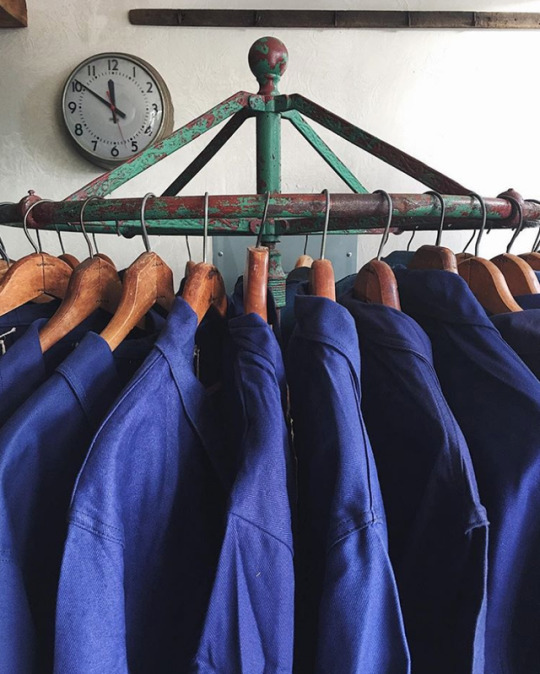

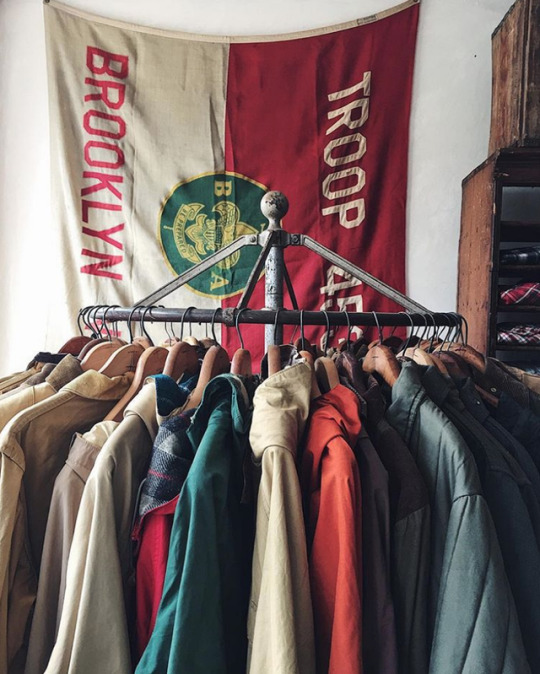


Digging in the Crates: Talking with Brian Davis of Wooden Sleepers
Wooden Sleepers is the kind of store I wish was near me. Brian Davis, the shop’s founder, has been around the menswear scene forever, but first opened his shop seven years ago on Etsy. Back then, he just had simple listings for his vintage finds, which ranged from classic Americana to workwear to Ivy Style items. A few years later, he opened a brick-and-mortar shop in Brooklyn, which has been since become a destination spot for men’s style enthusiasts. Japanese menswear magazines such as Free & Easy have featured the store; GQ called it the best new vintage menswear shop in NYC.
When Brian opened his brick-and-mortar, he took down his online web shop in order to focus on his physical location. Carefully setting up the interior decor and presentation was a lot of work, too much to also include shooting photos and selling online. Now that Wooden Sleepers is more established, however, they’ve jumped back on the internet. This past month, they launched a fully dedicated online site (although inventory is still being added), and they’re been developing an in-house line of Wooden Sleepers totes, caps, and sweatshirts (we love all of it). They even shot a fall/ winter lookbook.
I recently sat down with Brian to talk about his store, his history with vintage clothing, and his style suggestions for guys who are are looking to incorporate a bit of vintage into their wardrobe.
Tell us about how you got into vintage clothing and how you started Wooden Sleepers.
I grew up on the east end of Long Island, skateboarding and listening to punk and hip-hop music. I lived with my grandparents at the time, a long way from any of the shopping malls. Buying second-hand clothes from local church shops was a way for me to rebel against the Abercrombie & Fitch crowd -- this was around the early- to mid-90s, when A&F was big. Looking back, a lot of the stuff I used to rummage through would later influence my taste in clothes as an adult – seersucker suits, oil-stained mechanic jackets, vintage Levi’s, etc.


Fast forward to 2010, I was working a corporate job and wanted a creative outlet. My girlfriend at the time, now my wife, encouraged me to set up my own clothing shop. This was when heritage and Americana were huge online. There were sites such as A Continuous Lean, Valet, and Put This On; New York City had the Pop-Up Flea; Etsy was just getting started, but was still a fairly unknown thing. So I started listing stuff online for my thrifted finds. We launched on Etsy in 2010 and then opened a brick-and-mortar in 2014.
That’s surprising because, right around that time, many brick-and-mortars started struggling. Do you find it difficult to do a brick-and-mortar business in NYC nowadays?
The New York Times had a story not too long ago about Bleecker Street, a big commercial area here with global brands such as Marc Jacobs and Ralph Lauren. At some point, the landlords got greedy and raised rents, and now all those businesses have had to move out. Maybe they could have afforded the rents, but it probably didn’t make sense given the amount of business they were getting from the area. And now, when you walk down Bleecker Street, there are a ton of empty storefronts.
My goal as a business was never about being part of that world. When I was looking for a shop space, I was looking for a place with a thriving community of small businesses. We found that in Red Hook in Brooklyn. Our street is very much orientated around mom-and-pop businesses, with great restaurants and small shops. We’ve actually seen our business grow year after year.


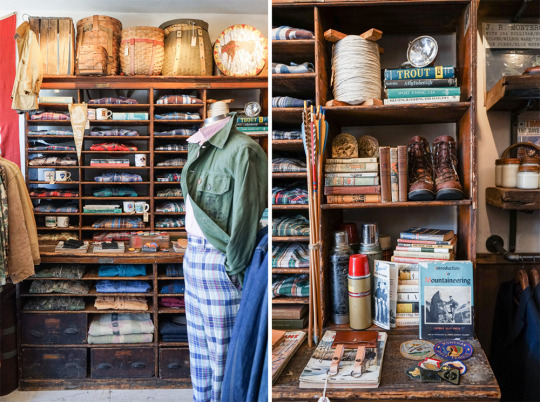
But many small NYC clothing stores have closed – Gentry, French Garment Cleaners, Carson Street Clothiers. It’s not just big brands that are struggling, it seems like it’s everyone. People are so used to comparison-shopping online, they’ll find the cheapest price possible for any given item. Do you feel you’ve been able to escape this as a vintage clothing store?
I think so. Although you can still comparison shop with vintage clothes, nothing is ever going to be the same exact piece. If you find something and it’s “the one,” you may never see it again. Sometimes there are idiosyncratic details or nuances that make it just right.
I also think we’re lucky to have a community that supports us. As a consumer myself, I try to support local and small businesses because I know those companies can easily disappear. And that’s not great for the neighborhood. We have many customers outside of NYC, but we’re also lucky to have lots of guys in the neighborhood that enjoy shopping with us. And they’re guys who aren’t going to get on the computer to see if they can find something for ten bucks cheaper.
How do you get your stuff?
No two days are the same. There are wholesale places that sell bales of vintage clothing. So, you go and buy these dirt-cheap lots, sorted by types of clothes – sweatshirts, t-shirts, jeans, etc. But you have to buy so much junk order to get a few gems. That’s how you get these huge vintage stores with a ton of inventory, with racks and racks of stuff.
Our business model is the exact opposite of that. We have a very small store, which forces us to edit. I only want the gems. Which means I have to go out and source things myself, often piece-by-piece. That can mean anything from crawling around an attic to get vintage chore coats to digging around an estate sale. Sometimes I’ll follow a lead I read about; sometimes I network with other pickers around the country. The key is to always be sourcing because out of ten leads, only a few will be good.
You network with other vintage sellers?
Yea, it helps to have people out there who can tell you when they’ve found something, but aren’t in your specific market. I once met an antiques dealer at a flea market who had a stack of old work clothes. I bought the jackets and told him I had a vintage clothing store in Brooklyn. So, we traded info.

A few weeks later, he called me out of the blue and told me he found an old, boarded up mom-and-pop shoe store in Ohio that has been closed since the 1970s. Inside were hundreds of deadstock boots. He wanted to know if I was interested in buying them.
I was skeptical at first since sometimes things are deadstock for a reason – maybe they’re in odd sizes, for example – but he promised they had a good size range and everything was in great condition. So, I told him I was interested. He ended up driving all the way to NYC from Ohio and we met up at my store at midnight. I bought 150 pairs of boots from his inventory. Had shoeboxes going up to the ceiling that night.
I’m surprised those things still happen. I can imagine finding up an old boarded-up place with deadstock items in the ‘80s, but with the internet, it feels like anyone can offload stuff online.
I’m as surprised as you are, but those pickers still exist. From a business perspective, you’re getting the best margin. You’re getting stuff that people think is garbage, so you’re getting it for the lowest price, and then you’re able to find specialty collectors or buyers. It takes a ton of work. These people are often waking up at 3am just to find things, driving around searching for old stores, looking for hidden gems. It takes a certain kind of person.
Do you ever get people coming in off the street with an unusual find for sale?
Not yet, but I once got a call from Richard Press, the former President of J. Press. It was great because I’ve always been a huge fan of the company. He helped broker a sale where I was able to get a bunch of stuff that was in the personal collection of a former J. Press tailor. One that had worked for the company from about the 1960s to the ‘80s. In the collection, there were hundreds of ties, sport coats, trousers, and deadstock shirts. It was so great to see Richard’s face light up, to see how excited he got about clothes. I feel like it’s so easy to get jaded about things, especially in the fashion industry, but Richard had this youthful excitement about him when he saw old things from his family’s store. It was really special.
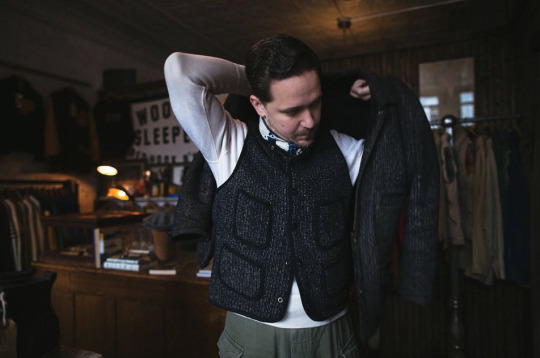

Are there things you’ve picked up along the way that you’ve decided to keep it yourself?
Well, I always want to give my customers the first crack. I’ve always hated those vintage stores that dangle the best stuff from the ceiling, but only for decoration. That said, I’m an outerwear nut and NYC winters can be brutal, so I was pretty excited to get a Brown’s Beach jacket to go along with the vest. The jackets are rarer than the vest, and I was lucky to find one that fits. My 1940s USN deck jacket is also a favorite. Mine is olive; the navy one is a bit of a unicorn.
A lot of the stuff I wear, however, isn’t that rare. I like madras shirts, old Brooks Brothers button-downs. I like cut-off military khakis, vintage military jungle jackets. Anything from that ‘60s and ‘70s Vietnam War era, in the OG-107 cloth. Some of those vintage military fabrics were made from a cotton-poly blend, especially in the later years, but the earlier stuff was often pure cotton. That’s the stuff you want because it ages in a really nice way.
As a guy who cleans and repairs things for his store, do you have any tips on how to clean vintage clothing?
A lot of it is common sense. Cotton things can be thrown into the wash; wool items will often need to be hand-washed or dry cleaned. A lot of what I buy is vintage workwear, so they’re things that have been through a lot – a washing machine isn’t going to hurt them. There are some things I leave behind because they’re too raggedy, but there’s a lot you can save with a bit of mending and cleaning.
If you find a vintage item with a musty smell, you can also spray it with a 50/ 50 mix of white vinegar and water. It helps freshen it up a bit. The vinegar smell goes away, and with it, it takes out some of the smell you occasionally find in vintage clothes.


For readers who are interested in trying out vintage clothing, do you think there are some pieces that are easier to wear than others?
Definitely, go with the classics. A French chore coat or a Levi’s trucker jacket. Unless you’re shopping at the very high-end of the market, buying brands such as The Real McCoys or RRL, you can often get a vintage piece that’s cheaper and cooler than more mainstream items. Even a Levi’s trucker jacket from the 1980s is going to look better than a mainline Levi’s jacket in the same style, but new.
I also really like getting guys into bigger pants. The pendulum has swung so far into the slim-fit trend that guys can feel like it’s a revelation when they wear something fuller. Maybe a pair of fatigues isn’t right for the office, but they’re great for the weekend. For spring and summer, you can wear them with simple, canvas sneakers, such as Jack Purcells or Chuck Taylors. For fall, they look great with brown, plain-toe service boots. For me, the key to wearing fuller pants is that you don’t want a break. Otherwise, they can look really messy. If you roll them up a little, you get a fuller cut without any of the bagginess.

M-65 military jackets are also really easy to wear. 1950s and ‘60s military issue khakis. Denim chore coats. Especially with chore coats, if you’re not a connoisseur, you’re not going to care if a piece is from the ‘40s or ‘50s or ‘60s. The look is the same, which means you can come up on something that looks great, but is reasonably affordable. Again, they go great with jeans, sweatshirts, and heavy boots. They can fit a bit roomy, but I think that’s the charm.
I know what you mean. Sometimes when the fit is too precise, especially with workwear, an outfit can seem too precious. Ethan Newton once told me how he likes vintage leather jackets because they fit in idiosyncratic ways – which is just another way of saying they don’t fit perfectly. I think that can be good with certain looks.
I agree. We’ve spent so much time talking about effortless style, but sometimes guys get too worked up over details. Just put on the jacket and wear it. A lot of this is much simpler than sometimes it’s presented online. It goes back to the first day of school and wearing a jacket that makes you excited, a jacket that makes you feel cool. It can be about a feeling.
Thanks for your time, Brian.
Readers interested in Wooden Sleepers can visit them in Red Hook, Brooklyn or shop from their new online store. They’re also on Instagram and Twitter, where you can keep up with their daily happenings.


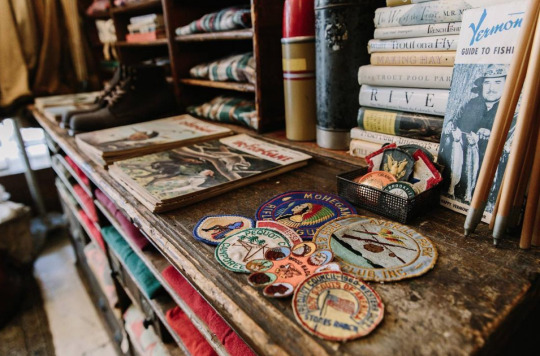
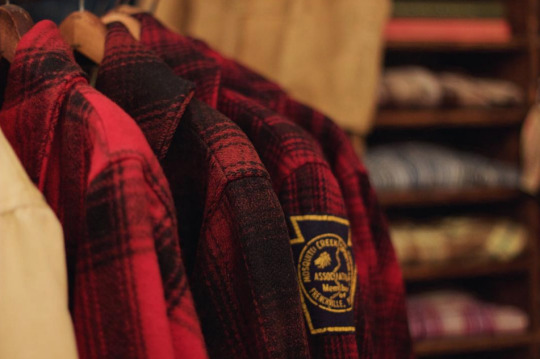

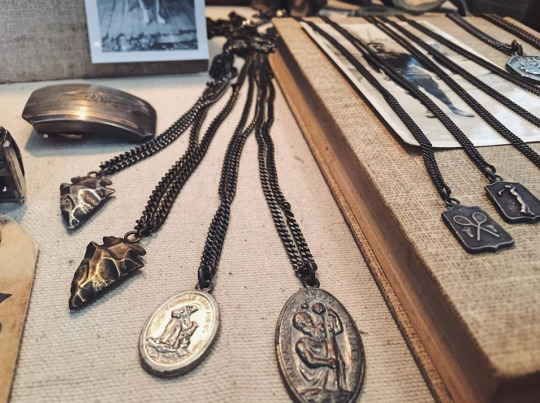








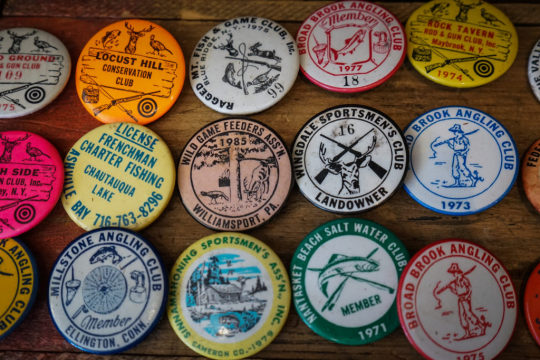


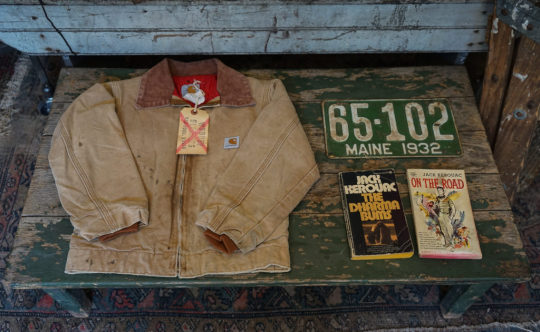

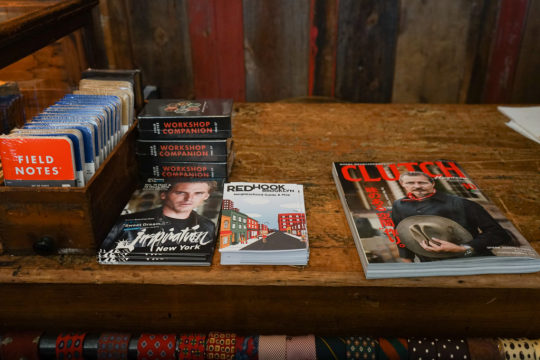



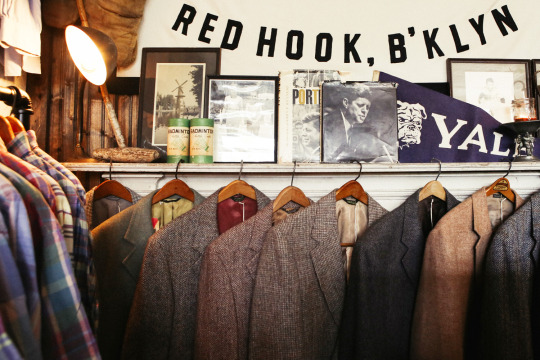
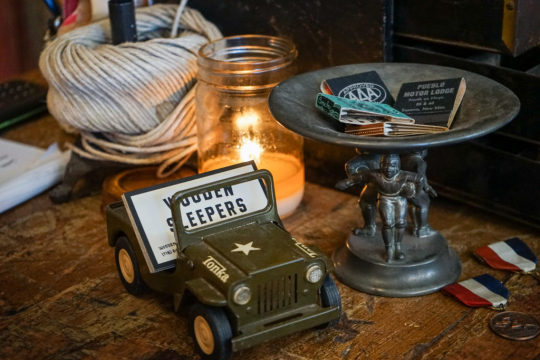

167 notes
·
View notes
Text
How the Republicans became the party of Putin
Would somebody please help me out here: I’m confused,” read the email to me from a conservative Republican activist and donor. “The Russians are alleged to have interfered in the 2016 election by hacking into Dem party servers that were inadequately protected, some being kept in Hillary’s basement and finding emails that were actually written by members of the Clinton campaign and releasing those emails so that they could be read by the American people who what, didn’t have the right to read these emails? And this is bad? Shouldn’t we be thanking the Russians for making the election more transparent?”
Put aside the factual inaccuracies in this missive (it was not Hillary Clinton’s controversial private server the Russians are alleged to have hacked, despite Donald Trump’s explicit pleading with them to do so, but rather those of the Democratic National Committee and her campaign chairman, John Podesta). Here, laid bare, are the impulses of a large swathe of today’s Republican Party. In any other era, our political leaders would be aghast at the rank opportunism, moral flippancy and borderline treasonous instincts on display.
Instead, we get this from the president of the United States, explaining away his son’s encounter with Russian operatives who were advertised as working on behalf of the Kremlin: “Most politicians would have gone to a meeting like the one Don jr attended in order to get info on an opponent. That’s politics!” And from elected Republicans, we get mostly silence—or embarrassing excuses.
Never mind that Trump Jr. initially said the meeting was about adoption, not a Russian offer of “ultra sensitive” dirt on Hillary Clinton. We’ve gone from the Trump team saying they never even met with Russians to the president himself now essentially saying: So what if we did?
What I never expected was that the Republican Party—which once stood for a muscular, moralistic approach to the world, and which helped bring down the Soviet Union—would become a willing accomplice of what the previous Republican presidential nominee rightly called our No. 1 geopolitical foe: Vladimir Putin’s Russia. My message for today’s GOP is to paraphrase Barack Obama when he mocked Romney for saying precisely that: 2012 called—it wants its foreign policy back.
***
I should not have been surprised. I’ve been following Russia’s cultivation of the American right for years, long before it became a popular subject, and I have been amazed at just how deep and effective the campaign to shift conservative views on Russia has been. Four years ago, I began writing a series of articles about the growing sympathy for Russia among some American conservatives. Back then, the Putin fan club was limited to seemingly fringe figures like Pat Buchanan (“Is Vladimir Putin a paleoconservative?” he asked, answering in the affirmative), a bunch of cranks organized around the Ron Paul Institute and some anti-gay marriage bitter-enders so resentful at their domestic political loss they would ally themselves with an authoritarian regime that not so long ago they would have condemned for exporting “godless communism.”
Today, these figures are no longer on the fringe of GOP politics. According to a Morning Consult-Politico poll from May, an astonishing 49 percent of Republicans consider Russia an ally. Favorable views of Putin – a career KGB officer who hates America – have nearly tripled among Republicans in the past two years, with 32 percent expressing a positive opinion.
It would be a mistake to attribute this shift solely to Trump and his odd solicitousness toward Moscow. Russia has been targeting the American right since at least 2013, the year Putin enacted a law targeting pro-gay rights organizing and delivered a state-of-the-nation address extolling Russia’s “traditional values” and assailing the West’s “genderless and infertile” liberalism. That same year, a Kremlin-connected think tank released a report entitled, “Putin: World Conservativism’s New Leader.” In 2015, Russia hosted a delegation from the National Rifle Association, one of America’s most influential conservative lobby groups, which included David Keene, then-president of the NRA and now editor of the Washington Times editorial page, which regularly features voices calling for a friendlier relationship with Moscow. (It should be noted here that Russia, a country run by its security services where the leader recently created a 400,000-strong praetorian guard, doesn’t exactly embrace the individual right to bear arms.) A recent investigation by Politico Magazine, meanwhile, revealed how Russian intelligence services have been using the internet and social networks to target another redoubt of American conservativism: the military community.
Today, it’s hard to judge this Russian effort as anything other than a smashing success. Turn on Fox News and you will come across the network’s most popular star, Sean Hannity, citing WikiLeaks founder Julian Assange as a reliable source of information or retailing Russian disinformation such as the conspiracy theory that murdered DNC staffer Seth Rich—who police say was killed during a robbery attempt—was the source of last summer’s leaks, not Russian hackers. Fox’s rising star Tucker Carlson regularly uses his time slot to ridicule the entire Russian meddling scandal and portray Putin critics as bloodthirsty warmongers. On Monday night, he went so far as to give a platform to fringe leftist Max Blumenthal — author of a book comparing Israel to the Third Reich and a vocal supporter of the Assad regime in Syria — to assail the “bootlicking press” for reporting on Trump’s Russia ties. (When Blumenthal alleged that the entire Russia scandal was really just a militarist pretext for NATO enlargement, Carlson flippantly raised the prospect of his son having to fight a war against Russia, as he did in a contentious exchange earlier this year with Russian dissident Garry Kasparov. At the time, I asked Carlson if his son serves in the military. He didn’t respond).
Meanwhile the Heritage Foundation, one of Washington’s most influential conservative think tanks and a former bastion of Cold War hawkishness, has enlisted itself in the campaign against George Soros, the billionaire philanthropist whose work promoting democracy and good governance in the former Soviet space has made him one of the Kremlin’s main whipping boys.
And it’s not just conservative political operatives and media hacks who have come around on Russia. Pro-Putin feelings are now being elucidated by some conservative intellectuals as well. Echoing Kremlin complaints that Russia is a country which has been “frequently humiliated, robbed, and misled” – a self-pitying justification for Russian aggression throughout history – Weekly Standard senior editor Christopher Caldwell extolls Putin as “the pre-eminent statesman of our time.”
How did the party of Ronald Reagan’s moral clarity morph into that of Donald Trump’s moral vacuity? Russia’s intelligence operatives are among the world’s best. I believe they made a keen study of the American political scene and realized that, during the Obama years, the conservative movement had become ripe for manipulation. Long gone was its principled opposition to the “evil empire.” What was left was an intellectually and morally desiccated carcass populated by con artists, opportunists, entertainers and grifters operating massively profitable book publishers, radio empires, websites, and a TV network whose stock-in-trade are not ideas but resentments. If a political officer at the Russian Embassy in Washington visited the zoo that is the annual Conservative Political Action Conference, they’d see a “movement” that embraces a ludicrous performance artist like Milo Yiannopoulos as some sort of intellectual heavyweight. When conservative bloggers are willing to accept hundreds of thousands of dollars from Malaysia’s authoritarian government to launch a smear campaign against a democratic opposition leader they know nothing about, how much of a jump is it to line up and defend what at the very least was attempted collusion on the part of a brain-dead dauphin like Donald Trump Jr.?
Surveying this lamentable scene, why wouldn't Russia try to “turn” the American right, whose ethical rot necessarily precedes its rank unscrupulousness? It is this ethical rot that allows Dennis Prager, one of the right’s more unctuous professional moralists, to opine with a straight face that “The news media in the West pose a far greater danger to Western civilization than Russia does.” Why wouldn’t a “religious right” that embraced a boastfully immoral charlatan like Donald Trump not turn a blind eye toward—or, in the case of Franklin Graham, embrace—an oppressive regime like that ruling Russia? American conservatism is no better encapsulated today than by the self-satisfied, smirking mug of Carlson, the living embodiment of what Lionel Trilling meant when he wrote that the “conservative impulse” is defined by “irritable mental gestures which seek to resemble ideas.”
***
The entire Trump-Russia saga strikes at a deeper issue which most Republicans have shown little care in examining: What is it about Donald Trump that attracted the Kremlin so?
Such an effort would be like staging an intervention for a drunk and abusive family member: painful but necessary. One would have thought a U.S. intelligence community assessment concluding that the Russians preferred their party’s nominee over Hillary Clinton would have introduced a bit of introspection on the right. Moments for such soul-searching had arrived much earlier, however, like when Trump hired a former advisor to the corrupt, pro-Russian president of Ukraine as his campaign manager last summer. Or when he praised Putin on “Morning Joe” in December of 2015. Republicans ought to have considered how an “America First” foreign policy, despite its promises to build up the military and “bomb the shit out of” ISIS, might actually be more attractive to Moscow than the warts-and-all liberal internationalism of the Democratic nominee, who, whatever her faults, has never called into question the very existence of institutions like the European Union and NATO, pillars of the transatlantic democratic alliance. Now that he’s president, Trump’s fitful behavior, alienating close allies like Britain and Germany, ought give Republicans pause about how closely the president’s actions accord with Russian objectives.
But alas there has been no such reckoning within the party of Reagan. Instead, the Russia scandal has incurred a wrathful defensiveness among conservatives, who are reaching for anything – paranoid attacks on the so-called American “deep state,” allegations of conspiracy among Obama administration holdovers – to distract attention from the very grave reality of Russian active measures. To be sure, the Republican Congress, at least on paper, remains hawkish on the Kremlin, as evidenced by the recent 98-2 Senate vote to increase sanctions against Russia for its election meddling and other offenses. But in no way can they be said anymore to represent the GOP party base, which has been led to believe by the president and his allies in the pro-Trump media that “the Russia story” is a giant hoax. It wasn’t long ago that the GOP used to mock Democratic presidential candidates for supposedly winning “endorsements” from foreign adversaries, like when a Hamas official said he “liked” Barack Obama in 2008. Today, most Republicans evince no shame in the fact that their candidate was the clearly expressed preference of a murderous thug like Vladimir Putin.
If Republicans put country before party, they would want to know what the Russians did, why they did it and how to prevent it from happening again. But that, of course, would raise questions implicating Donald Trump and all those who have enabled him, questions that most Republicans prefer to remain unanswered.
Politico
3 notes
·
View notes
Text
Greta Gerwig & Joe Swanberg: The Penny-Pinching Future of Indie Cinema
By Steve Dollar | March 2, 2009
source: https://www.pastemagazine.com/articles/2009/03/greta-gerwig-joe-swanberg-the-penny-pinching-futur.html
There’s low-budget guerrilla filmmaking and then there’s low-budget guerrilla filmmaking. Greta Gerwig, the 25-year-old star of indie-cinema micro-faves such as Hannah Takes the Stairs, Nights and Weekends and Baghead, recalls an inspiring moment during a visit home to her native California. Making an overnight stop at a motel in Santa Barbara, she flipped through the TV channels until she was stopped cold by something on the local public-access station. There, she discovered a very curious action flick called The Pharaoh Project.
“It was beyond amazing,” Gerwig says, her cadence by turns hesitant and headlong, as she recalls the insane saga about an elite squad of legendary warriors (Genghis Khan! Alexander the Great!) reincarnated to wreak havoc on the modern world. Really, it was like the director and his beefiest bouncer buddies were trying to create a Steven Seagal sci-fi/action epic on a PBR budget. “The most official-looking car they could get their hands on was a cream-colored Toyota 4Runner, but they played it like it was an FBI armored vehicle.
Gerwig, a Barnard-schooled playwright, screenwriter and director, has won glowing reviews for her comedic acting skills, mostly channeled into fetchingly flaky characters as romantically befuddled as befuddling. But even if the Los Angeles Times calls her “an ingénue for the text-message set,” and even if she’s about to start shooting John C. Reilly in her next feature, she still shares a nothing-fancy Williamsburg pad with a roommate. Make fun of The Pharaoh Project all you want. Gerwig won’t. “I just kept watching because there was so much there to admire,” she says. “It isn’t that far removed from the kind of movies I’ve made. The ‘let’s just go do it’ attitude. We’re interested in different things. I’m interested in the million tiny deaths that occur in everyday human interactions, and they’re interested in sweet-ass roundhouse kicks. But the motivation to make something is similar.”
Along with her friend and sometime collaborator Joe Swanberg, 27, Gerwig is one of the most prolific characters in a new wave of young filmmakers lighting up the indie landscape. The past few years have seen the arrival of a slew of talented, original directors who have thrived despite—and sometimes because of—miniscule budgets and improvised means: The list includes the Duplass brothers (Baghead), Aaron Katz (Dance Party, USA; Quiet City), Todd Rohal (The Guatemalan Handshake), Ron Bronstein (Frownland), Mary Bronstein (Yeast), Craig Zobel (Great World of Sound), Ry Russo-Young (Orphans, You Won’t Miss Me), Frank V. Ross (Hohokam, Present Company), Kentucker Audley (Team Picture), Jeff Nichols (Shotgun Stories) and Andrew Bujalski (Funny Ha Ha, Mutual Appreciation).
Early on, Bujalski’s sound mixer, Eric Masunaga jokingly referred to one of the films as “mumblecore,” and the label stuck for a while. It was catchy, and spoke to the indie-rock flavor of efforts like Swanberg’s LOL, in which urban post-grads stumble in and out of relationships, bands and poorly furnished apartments, endlessly discussing feelings they can’t always articulate. The use of consumer-grade handheld digital-video cameras, spontaneous dialogue and casts comprised mostly of other budding directors are also common tendencies, although by no means exclusively so. Katz gives his actors scripts. Bronstein, who co-starred with his wife Mary in the Swanberg-shot Web series Butterknife, works in 16mm. So does Zobel. Not everyone digs Final Cut software. In other words, these filmmakers are hardly clones—but they have more in common with one another than they do with everyone else.
This movement, as such, has branched out as Swanberg and his peers have begun to mature after years of film festivals such as Austin’s annual SXSW, which became a flourishing seedbed for the movement around 2005.
“The technology changed in the mid-to-late ’90s,” Swanberg says, giving his socio-cultural analysis as he takes a chair next to Gerwig in a photographer’s studio near the Manhattan Port Authority. It’s a brittle winter evening after a day of hiking around bleak locales in upstate New York, where the pair posed as Depression-era vagabonds—even as all-too-real panhandlers proliferate on the streets outside. “The resolution got better, and the Internet allowed social networking to happen like it hadn’t before. The threat of the actors strike in 2001 that paved the way for a lot of reality TV to hit the mainstream made a huge impact on the way mass audiences perceived handheld video. Because they got used to watching it, all in one year, with Survivor and every other show that came along shot in a run-and-gun style on a small camera.”
It wasn’t long before young filmmakers hit the festival circuit with their own low-budget projects, though, as Swanberg notes, “A bunch of celebrities had to make movies on [digital video] to legitimize it. Ethan Hawke had to make one, and Richard Linklater and Robert Rodriguez. Jennifer Jason Leigh and Alan Cumming made The Anniversary Party, and everyone said it was cool, and even then it took a lot longer.”
Swanberg began shooting so-called “webisodes” in 2005 with Young American Bodies, a series for the erotically minded Nerve.com, which reflected the diaristic—OK, blog-like—intimacy of his features. “This whole idea of exposing very personal inner thoughts to a general public whether they wanted it or not seemed really crazy five years ago,” he says. “But it was around the same time that these smaller movies started to do something similar: I’ll tell my story and my friend’s story. If it plays festivals and people see it, great, and if it doesn’t, it still exists. I made my first two movies for less than 3,000 bucks.”
That vow of insularity can’t stick forever, though. Swanberg’s new film, Alexander the Last premieres March 14 at SXSW and, on the same day, becomes available by demand on IFC, as part of its Festival Direct series. The idea, Swanberg explains, is to make the film broadly accessible while it’s still playing festivals, and not wait for interest to fade. “The way people are watching stuff is changing,” he says. “If I don’t start putting these movies out very quickly they will start backing up on each other. Theatrical distribution doesn’t make sense anymore.”
Benten Films, a DVD outfit run by two film critics—Andrew Grant of FilmBrain.com and Aaron Hillis of GreenCine.com—has done an impressive job of packaging and promoting work by Swanberg and fellow indie upstarts like Audley, Rohal and Katz. But it’s not easy. “There aren’t enough distributors to go around,” Hillis says. “If you’re an independent filmmaker there are not a lot of options out there. There’s no more middle class. It’s just a matter of time before it becomes either The Dark Knight or mumblecore, with nothing in between.”
If that’s the case, Swanberg’s work doesn’t suffer from a smaller screen. Alexander—a slender (72 minutes) but quietly observant drama that says as much with silence as with its improvised dialogue—is lucky to have an irresistible center of gravity in Jess Weixler (Teeth), a rising star whose face is a delicate map of feeling. About nothing if not process, the film charts the keenly attenuated emotional swings of Alex, a young actress drawn to her handsome co-star Jamie (Barlow Jacobs) while her rock-musician husband is on the road. To further complicate matters, she has introduced the fresh-from-Kentucky Jamie to her older sister Hellen (Amy Seimetz), who actually engages in the fling Alex and Jamie pretend to have onstage. The milieu may not be too far away from the tempest-in-a-beer-can angst of The Real World, but the spirit is much closer to the bedroom intimacies of the French New Wave. Yet, even if Swanberg’s actors are at home with casual nudity and candid couplings, their journeys of self-discovery are not linked to a larger political or philosophical agenda. They prefer singing their own songs and tinkering on thriftshop keyboards to dropping postmodern allusions to art and cinema. Their point is not to be clever, but to be honest. The film also broadens Swanberg’s professional circle. Jane Adams (Happiness) takes a small but key role, and Brooklyn filmmaker Noah Baumbach (The Squid and the Whale), for whom Swanberg has been working as a cameraman and assistant director, helped produce when another project failed to jell. Likewise, the Duplass brothers, whose ambitions skew more mainstream, have cast John C. Reilly, Marisa Tomei and Jonah Hill for their next comedy. And Reilly also takes the lead in Gerwig and collaborator Alison Bagnall’s Funny Bunny.
“There’s an audience now, and I’m wanting things I didn’t want before,” Swanberg says. “I want to shoot in other cities now, and I want to shoot in HD. I want to rent apartments, and I want sailboats and all these other elements. But before, I was content with a few people in a room.”
Gerwig—who spent the past year racking up performances in neo-grindhouse genre flicks like Ti West’s House of the Devil and a non-mumblecore indie in which Iggy Pop plays her dad—has a good laugh about her efforts to go Hollywood. “I’ve made a bunch of audition tapes,” she says. “I start cracking up because I can’t get through the scenes. Some of them, I have to cry and say things in Southern accents.” She drifts into her best Scarlett O’Hara: “Johnny did not kill that bay-buh! I killed it! Because I hated it!” Nonetheless, the actress confesses, sure, “I’d love to be the girl in the dinosaur movie.” Well, OK, maybe a movie with little plastic dinosaurs.
Gerwig says she was astonished to learn that the guys who made Cloverfield are fans. “The woman who casts Gossip Girl loves Aaron Katz. What!? But maybe I’m not supposed to say that. The number of people who are around watching you out of the corner of their eye is amazing.”
Swanberg—whose output has increased since he brought on Anish Savjani (Wendy and Lucy) as a producer—won’t likely be taking on any Cloverfield sequels, even with his handheld-video skills. If his films don’t make money, he’ll still shoot. “It’s a compulsion for me,” says Swanberg, who also finds time to continue acting in his friends’ movies, shooting Web projects and helping his wife, Kris Williams, with both her filmmaking and burgeoning gourmet-ice-cream business. “It’s not like I started doing it because I was good at it. Nor is it that I continue to do it because I’m good at it. I do it because I can’t help it, and I don’t know what else to do. I already know there will be a period when I will make 10 of them that nobody sees or likes or writes about. But the reason why I will continue through that period that nobody cares is not because they will care again but because I can’t help it. It’s selfish. I’m making these things for me.”
0 notes
Link
Imagine a Twilight Zone episode that goes something like this: An individual regularly takes to the internet in the hopes of making himself heard, railing against everything from the “hatefulness” of Democrats to the degradation of modern society. All he wants is an audience. But then the hapless individual complains on Twitter that the new CBS All Access reboot of The Twilight Zone is yet another beloved cultural property that’s been ruined by leftist cultural warriors. Finally, his wish has come true: He goes viral, and is subsequently roasted by journalists and internet celebrities and comedians with millions of followers. He’s dragged so mercilessly, in fact, that the individual eventually has to set his profile to private—depriving himself of the one outlet he had for communicating with the world.
Versions of this scenario did actually happen recently, as disgruntled viewers responding to new episodes of The Twilight Zone found themselves given short shrift for expressing dismay that the update, produced by Jordan Peele and Simon Kinberg, is too “political.” The Twilight Zone, of course, has always had something to say about the state of the world—not since the time of Jesus himself have center-left parables with clear moral lessons been so efficiently disseminated. Rod Serling devised the concept for the show precisely because 1950s network producers were so skittish about overt political messages in the wake of McCarthyism. On television in 1956, Serling later wrote in his book Patterns, “to say a single thing germane to the current political scene was absolutely prohibited.”
Sci-fi, though, was a different story. By wrapping his ideas in allegory, Serling could scotch the censors and say exactly what he wanted about totalitarianism, mass hysteria, prejudice, selfishness, conspiracy theorists, hate. Each episode of The Twilight Zone had a distinct message enunciated in Serling’s narration, making the moral of the story clear for even the most careless viewer. In “The Obsolete Man” (1961), a fable about a librarian in a futuristic state that has outlawed books, Serling observes how the “iron rule” of dictatorships is that “logic is an enemy and truth is a menace.” In “The Brain Center at Whipple’s” (1964), a story about a factory owner who replaces all his employees with technology, only to suffer the same fate, Serling notes that “there are many bromides applicable here: ‘too much of a good thing,’ ‘tiger by the tail,’ ‘as you sow so shall you reap.’” The Twilight Zone is essentially Aesop with a 20th-century imagination. It’s also timeless.
Oddly enough, these morals are missing from the new series, which features an on-camera Peele in Serling’s role. So is the element of grim justice that both The Twilight Zone and its modern heir, Black Mirror, have always held at their core—the kind of karmic inevitability that sees an SS captain subjected to the same torture he meted out to prisoners, or a woman sentenced to endure the fear and violence of an angry mob after committing a horrendous crime herself. Serling’s The Twilight Zone is defined by its twists, but not a single thing happens in the new series that you won’t be able to predict, at least from the four episodes made available for review. This isn’t really a reboot; it doesn’t even qualify as fan fiction. With the exception of one superior episode, “Replay,” it’s hard to conceive that an artist as prodigiously talented and thoughtful as Peele is creatively involved at all.
I attempted to decipher the messages that the first four episodes might be trying to convey, but only ended up stumped. The premiere installment, available for CBS All Access subscribers, is titled “The Comedian,” and stars Kumail Nanjiani as a stand-up, Samir, whose politically charged routine keeps bombing with audiences. (Which, really? This is the era of John Oliver eviscerations and Hasan Minhaj and Nanette.) After one especially disastrous set, Samir randomly encounters an elusive comedy great (played by Tracy Morgan), who tells him the secret to success: He has to put more of his personal life into his act. “The audience don’t care what you think,” Morgan’s character says. “They care about you.”
Samir tries riffing on new subjects—his dog, his nephew, his high-school bullies. There is, of course, a cost to those he brings into his act, and the more successful Samir gets, the more he ends up losing. Certain themes that recur in the episode seem ripe for picking at: whether comedy counts as art, how comedians can offer insight into the human condition, whether comedy is about making people laugh first and foremost. But they’re left floating in the ether, while Samir goes through a series of superficial realizations about his own grandiosity and the Faustian bargain of fame. The question of what we’re supposed to take away from his story is a perplexing one. Is it that putting your personal life into your art is bad? (Because if so, I say again, Nanette.) Is this an elaborate rant about contemporary audiences being too shallow for insightful truths? Because that’s not what Serling thought.
This particular reboot has another problem, something that bedevils virtually every streaming show: Its episodes are way too long. Serling’s The Twilight Zone tied its stories up neatly within 30 minutes, including space for commercials. The brevity of the format dispensed with extraneous waffling—there was no time, for example, to show a comedian delivering the same joke about the Second Amendment five separate times. But there was space for a surprising amount of world-building (Serling’s narration did a lot of work here), and for a tidy one-act play that zips along. “The Comedian,” by contrast, is 54 minutes long. (It’s worth remembering that in 1963, The Twilight Zone’s running time was stretched to 60 minutes, but after one season the change was swiftly reversed.)
“A Traveler,” another new episode that runs longer than 50 minutes, suffers more from this extended storytelling time than most, given that its twist is apparent from the minute a mysterious man in a suit (Steven Yeun) appears in a remote Alaskan prison cell on Christmas Eve. The questions of who this man is, where he came from, and what he wants should be the most urgent issues underpinning the episode. But because the story devolves into a series of yawning subplots—a police deputy’s (Marika Sila) odd relationship with her brother, her antagonism toward her narcissistic boss (Greg Kinnear)—there’s very little tension surrounding the newcomer, who identifies only as A. Traveler. Yeun (Burning) is magnetic as the enigmatic interloper, and the episode has intriguing subtext about colonizers and the colonized that seems to beg for more overt allegorizing. But Peele’s closing narration, the part that’s supposed to explain to viewers how to interpret what they’ve just seen, is opaque. (“There’s no difference between myth and mistruth” means nothing no matter how you slice it.)
The best of the four new episodes, “Replay,” functions so well because it incorporates tension into its setup. Nina (Sanaa Lathan), is taking her son, Dorian (Damson Idris), to college, a fictional HBCU called Tennyson. Dorian wants to be a filmmaker and to inspire people with the stories he puts into the world. But it’s the camera Nina wields, an old-fashioned camcorder, that seems to have profound power after she discovers she can use it to rewind time.
This is the kind of slightly hokey, completely implausible, suspend-your-disbelief scenario that The Twilight Zone has always aced. It’s easy to imagine, say, a character played by Burgess Meredith discovering a clock with similar qualities in a 1960s-era episode, and then trying (and failing) to go back to his glory days, imparting a valuable be-careful-what-you-wish for message about nostalgia along the way. But in “Replay,” the camera itself isn’t the point so much as what Nina uses it for. Throughout the episode, she’s plagued by a racist highway cop, Officer Lasky (Glenn Fleshler), who poses grave danger to Dorian, and no matter how she tries to escape or placate him, there he is. “He keeps pulling us over, again and again and again,” a desperate Nina says in one scene, “no matter what route we take, how nice or mean we are … There’s nothing I can do.”
The episode is so powerful because it forces audiences to feel the frustration and fear that Nina feels, but also the inevitability of antagonists like this one. No matter how hard Nina tries to get Lasky to see her as a person, to buy him a slice of apple pie and tell him about how proud she is of her son and how much he means to her, Lasky can’t be swayed. Fleshler communicates his impotent rage, his petty tyranny over a stretch of highway, his racism. In Nina’s hands, the magical camcorder feels like a device that might help her escape what Lasky represents, but it turns out to be less powerful than something else she’s been ignoring. Cameras, the episode makes clear in one of its most resonant moments, aren’t enough.
“Replay” shows what a modern Twilight Zone could really be, offering the kind of sociopolitical analysis Serling excelled at, but without the folksiness of 1950s television. For the most part, though, the new series feels like anthology storytelling by the numbers, more concerned with Easter eggs and recurring themes (“Lasky” is also the name of a street in “The Comedian,” and the number 1015 repeats across episodes) than with trying to emulate what the original show did so well—making audiences see the world with more clarity.
“Nightmare at 30,000 Feet,” a dismal episode starring Adam Scott, is the worst of the four, a clunky, cutesy “what if” story about a magazine journalist on a flight to Tel Aviv. The story is loosely inspired by a vintage Twilight Zone episode with William Shatner, in which a man recovering from a nervous breakdown sees a gremlin on the wing of his commercial plane. Scott’s character, Justin Sanderson, is similarly recovering from PTSD after reporting in war zones, but when he takes his seat on the plane, he finds a mysterious audio device in the seat pocket in front of him. It plays him a podcast, seemingly from the future, that investigates the mystery of how the flight Sanderson is on ended in tragedy.
Forget the corniness of a podcast that portends the future, or the improbability of a world in which magazine journalists fly first class. The episode has no tension, no investment in any of the characters. You might be less curious about how the plane actually goes down than in how the producers managed to nail the production of the fake podcast itself—the smug, omniscient narrator and the clinky background music. But more damaging is how totally unclear it is what the episode is supposed to do. Serling’s original episode interrogated preconceived ideas about anxiety and mental confusion; his central character has no credibility because he’s suffered a nervous breakdown, and seems to fear being crazy even more than he fears actually being right about the gremlin. The new “Nightmare” has none of this subtext. “In his final moments, Justin Sanderson made the case that he did everything he could to avert disaster,” Peele opines. “But in the end, he was an investigative reporter unwilling to investigate himself, until it was too late.” Bromide salad. Cliché. Fin.
What’s strangest of all about the reboot is its defiant lack of darkness, its unwillingness to even scratch at the human psyche. This could be a possible response to the fact that Black Mirror already exists, and that its creator, Charlie Brooker, had The Twilight Zone at the forefront of his mind when he created it. The new Twilight Zone isn’t frightened of what technology is doing to us, as Black Mirror is, nor is it particularly concerned with Serling’s great preoccupation—how humanity has always found ways to torture itself. It has none of the indelible eeriness or the subconscious probings of Us, Peele’s most recent film, which is itself inspired by a Twilight Zone episode. Nothing feels sinister. Everything feels safe. In a world so weird that it’s frequently likened to a bad computer simulation, this Twilight Zone is blandness stretched into an hour-long format, storytelling that feels oddly neutered before it even begins.
from The Atlantic https://ift.tt/2WM8EUF
0 notes
Text
Why Marketers Should Care About James Patterson's Facebook Messenger-Only Novel
Generally speaking, I'm not really a fan of Facebook Messenger.
Call me a fuddy-duddy, but I've never quite forgiven our social networking overlord for requiring I have yet another app on my phone dedicated exclusively to Facebook. I will also never understand those friends and family members who insist on only contacting me through the messaging platform.
(Spare everyone from the drama -- if I don't respond on Facebook, call me like a sane person, instead of assuming I hate you.)
But then the news broke this week that James Patterson -- best-selling author and the 1990s book-to-movie powerhouse who transformed Matthew McConaughey from a deodorant-optional bongo player into a courageous young lawyer in Mississippi -- had decided to publish his new novel, The Chef, exclusively on the Facebook Messenger platform.
Patterson says the publishing industry's lack of innovation in the modern era moved him to experiment with creating the social media-based immersive experience.
“If Ulysses came out now, online, there would be like four readers, and they’d all say, ‘This sucks,’ and that'd be the end of Ulysses,” he said in an interview with Newsweek.
Strangely enough, for a story I considered an easily forgettable publicity stunt at first -- especially in the context of marketing -- Patterson's move opens up a larger discussion about the way brands and marketers can chart a similar digital path to reach consumers.
But First, What Does This Social Media Novel Look Like?
I'm going to be honest, it took me awhile to find it.
Even though I'm sure there are some obvious directions I missed, I didn't know what I was supposed to do. But eventually, after locating the Facebook Messenger app on the third page of a folder on my iPhone -- banished like an unruly child in timeout -- and searching for James Patterson like he was a contact, I stumbled upon The Chef.
Here's a quick video of me test-driving this experience on my phone this morning:
I haven't spent a ton of time with it, and I'm not 100 percent sure how far down the rabbit hole I will go. (I need an evening or so to fully evaluate the viability of something like this -- I fear change and have a tendency to declare something awful before I've even given it a chance, so... we'll see how it goes.)
That said, the overall idea here is very intriguing. And Patterson's move has reminded me how much I do enjoy immersive digital experiences like this.
The Power of Immersive Digital Social Experiences
There's an iPhone app called Shine that I'm marginally obsessed with. (FYI, it's not available for Android yet.)
Image courtesy of SheerLuxe, because I am lazy.
It's a self-care app that sends you daily affirmations, and you check-in each morning by answering the same two questions -- what are you grateful for today, and what are you going to do to make yourself feel good today?
Unlike the Patterson novel, Shine operates through its own independent application, instead of being funneled through a pre-existing social network.
But like the Patterson novel, it mimics an online messaging conversation you might experience through Facebook or text -- complete with multimedia like gifs, video, links, and audio -- so it is comforting through familiarity. It also requires active participation on my part to move the action forward.
Again, while I'm not sure how much I will enjoy this new frontier of reading a book, I can tell you that with Shine my practice of gratitude has never been more consistent.
(I'm definitely that person that spent $25+ on that Five Minute Journal everyone raved about for a hot minute, only to give up on it three days later. But with Shine, I'm closing in on 30 straight days of my gratitude practice, with no signs of slowing down.)
Why This New Approach Works for Brands
Granted, how well an app or digital experience like Shine or The Chef works comes down to how well researched and executed the underlying strategy is. Flashy technology is no substitute for actual substance, in the marketing world.
That said, my totally subjective opinion is that, when a brand nails this digital experience approach, it's incredibly addictive.
There are three benefits of this medium to thank for that:
First, as I mentioned, it's familiar. Even though the brand or the book may be new to me or other users, the fact that I intuitively understand the interface they're either using directly (or trying to emulate) makes it easy for me to teach myself how to interact with what's in front of me. Very little thinking is required to get me going.
Second, it feels personal. Intellectually, I understand that both The Chef and the Shine "texts" I interact with are programmed by people in advance and experienced by millions of other people in the exact same way. But it still feels like I have this one-to-one very human connection whenever I am talking to the robot in my hand. In the case of Shine, this feeling of having a mysterious digital friend telling me, "You go girl!" every single day shortened the runway significantly for me to go from casual user to rampant brand evangelist.
Third, that brand is now top-of-mind at least once a day. While The Chef has a limited shelf-life -- and who knows how long it might be until another similar digital literary experiment hits the internet -- it's now something that I look forward to playing with when I have more time after work today. And with Shine, the team there has scored a big win, because once a day, they have my full attention.
Of Course, I Still Have a Few Reservations
Here are my three primary concerns and/or grievances, in no particular order:
Out of side, out of mind? A physical book on my nightstand is a tangible, in-my-face reminder that I'm not reading something I said I would. In the digital world -- where everything on my phone is flashing, every website is trying to grab my attention, and my social network notifications sometimes go out of control -- I could see myself easily forgetting to keep up with an immersive digital book or app. In my mind, you're either completely memorable and winning at this medium, or you're collecting pixel dust in the corner.
Marketers ruin everything. Whenever something new and shiny shows up at the intersection of marketing and digital, we have a tendency to beat to death with a hammer. Use of this medium only works when it's done well and with purpose. I could see some poor brand spend lots of money dreaming up something like this, because they're trying to keep up with the Marketing Joneses across the street, but it all fails because of poor planning or a lack of understanding that it might not be the right fit for them or their audience. So, they wasted all of those resources on another pointless app or experience no one asked for.
Notifications make me feel guilty, and then I ignore you. Kind of like that promise you made to yourself on January 1 that you were totally, absolutely, 100%, for realsies going to start hitting the gym before 7 a.m. three times a week, it's easy to fall out of the habit of engaging and interacting with these digital attention-seeking apps and experiences. And when I do, I dread seeing the reminder notifications of, "Hey, haven't seen you in awhile." Suddenly, my reflexive feelings toward that brand are negative. Even though it's my fault that I'm a slacker, and the brand did nothing wrong, they still pay the price, because I'm not about to take any sort of responsibility with this.
"OK, What's the Bottom Line?"
Unlike getting started with video, you can't exactly get out there and start experimenting on the fly with this new digital marketing opportunity without some budget, development expertise, and a healthy dose of planning.
However, there is a considerable opportunity here for the right brand or individual -- whether you're transforming an every day experience like reading a story, or creating an immersive solution where historically people have struggled with low engagement or sticking with a new habit.
Again, you can't cut corners when it comes to strategy, and your brand will only succeed if you're solving an actual problem for an audience that is glued to the digital computer in their pocket. But I'm still excited to see who else gets it right next.
from Web Developers World https://www.impactbnd.com/blog/james-patterson-the-chef-facebook-messenger-book
0 notes
Text
WWE: Wrestlemania 34 - Not feelin it

With Wrestlemania 34 this Sunday in New Orleans, it's one of the most exciting times of the year for lots of people. For me personally, it's just another weekend. I hate to say that, but it's just an undeniable feeling for me. This is coming from someone who watched WWF/E from the time he was 5 until the time he was 26. It got to the point that I was just waiting around for things to change for the better - or at least, the way I remembered them being when I became a fan. Only they never did. That was likely impossible, as what I was remembering is undoubtedly through the rose tinted filter of nostalgia. Add in 3 hour long slogs of Raw every Monday night, and a lifelong fan was lost.
Not that any of this really matters. WWE is more profitable than they have ever been. Even the people that complain about the product still feed the machine with monthly $10 WWE Network subscriptions. Some of those people will even be in attendance Sunday night, just to voice their displeasure when Roman Reigns inevitably beats Brock Lesnar to become WWE champion. As somebody who was in attendance at Wrestlemania 30 (also in the New Orleans Superdome), I can attest, even the nosebleeds ain't cheap. So that's a lotta coin to drop on something you're unhappy with.
I remember WM 30 being the first time that a Wrestlemania was taking place at a location within driving distance. Still, I wasn’t sold. I remember feeling like I should be excited, but just couldn’t muster the energy. After all, initially, the original main event was set to be Randy Orton defending the WWE title against Batista, fresh from an underwhelming return made even worse by the fact that he was not Daniel Bryan. Daniel Bryan was the underdog who was undermined by the WWE powers that be (both in real life and in storyline) over and over again. Time and time again. Over and over and over.
...he got screwed over and beaten a lot.
Then, without any satisfying conclusion (or any conclusion at all really), he was pushed to the side in favor of the oversized, larger than life returning former champion and current movie star. It didn’t go over well. Luckily, the fans clamoring for Daniel Bryan to be in the Wrestlemania main event became so undeniable that WWE canceled their Orton vs. Batista plans, and made Bryan the focal point.
With this change, I was in. I’d been watching Bryan wrestle since I was in middle school. I had the rare opportunity to follow him from the very beginning of his career, every step of the way, all the way to the main event of WWE’s biggest show of the year. I really doubt I’ll ever experience anything quite like that as a wrestling fan ever again. Win Bryan won the WWE title, I damn near shed a tear, even from my $200 nosebleed seat (I’m serious - it was as high up as you could possibly be in that building). I reminisce on all of this to say - WWE MADE me go to this show. There was no way I was gonna miss it, and it will undoubtedly go down as my favorite experience as a wrestling fan.
Of course, this was also the night that Undertaker’s 20+ year Wrestlemania winning streak came to an end. That’s right, I can say I was there. It was honestly the most surreal thing I have ever seen. My best friend and I looked at each other mouth agape (yeah, like that one guy they showed in the front row). Surely there was a mistake? The ref miscounted. The ring bell rang itself on accident. But, no, we had witnessed history (of a predetermined sport, but still). That, plus seeing Daniel Bryan, who was unequivocally my GUY for 10 years, win the WWE title, I kinda consider WM 30 my series finale as a WWE fan. All those years as a fan had been leading to it, and it blew my freaking mind.
Things also went pretty downhill after that. 3 hour Raws became more commonplace. The Shield broke up and went from being revolutionary performers to pretty run of the mill guys. Bryan got injured and had to retire. CM Punk was gone and not coming back. I went from never missing a Raw or Smackdown, to only sometimes reading results. WM 31 followed a year later, and wasn’t bad, but couldn’t match the year before in my mind. WM 32 followed, and was pretty rough. Royal Rumble leading into WM33 was extremely disappointing, and at that point, I vowed to not be let down anymore. Years of overall general disinterest as a fan mounted, and I gave WWE the deuces. WM 33 was the first Wrestlemania I ever missed. And I haven’t watched a Raw, Smackdown, or PPV since.
WM 34 will be the 2nd Wrestlemania that I’ve ever missed. Not only that, but I could easily be there (hopefully in better seats). I won’t be. Here’s why:
1) Daniel Bryan is back. Now, I’m not totally abject to this. I just personally feel that he accomplished all there was to accomplish. He’s married, and his wife just recently gave birth to their first child. I don’t think pushing his body is the best idea when considering all of these circumstances. Then again, it’s his body, and ultimately, his decision. Of course, I’m (selfishly) elated to see him back. He’s an all time favorite of mine, and he’s still relatively young. I know he can still deliver. Here’s the problem. WWE are not positioning his return as the colossal event that it is. We have been led to believe that he would never wrestle (for WWE at least) again. They buck these expectations by having him tweet out the news that he’s returning. Then they have him get beat up and hospitalized on TV the same night. Sure, it makes you hate the guys that jumped him, and makes you want to see him get even. After all, now that he’s cleared to wrestle again, he CAN get even. But, unfortunately, this is not the point here. The point of Daniel Bryan’s return is so he can team with Vince McMahon’s middle aged, non-wrestler son, Shane. Shane is a Wrestlemania staple, only this year, they didn’t have much planned for him. It’s quite a coincidence that WWE goes from being so against Daniel Bryan’s in ring return UNTIL they need something for Vince’s son to do at Wrestlemania. I hope I’m wrong, but it doesn’t look very good regardless. Bryan’s return (in New Orleans nonetheless) is worthy of a main event position. Instead, we’re getting a lukewarm tag match in the middle of the show. A huge moment totally squandered by WWE. Any long term fan will tell you - this isn’t a rare occasion.
2) The main event is lame and predictable. Roman Reigns and Brock Lesnar already wrestled for the WWE title at WM 31. It was actually pretty bad ass. It didn’t end with a legitimate finish (Seth Rollins won the match even though he wasn’t in it, because wresting is bizarre), so it makes sense that they would need to wrestle again to settle the score once and for all. The only problem is, Brock is leaving for a UFC return, and the fans that pay big money to attend WWE events, like Wrestlemania, hate Roman Reigns. This ain’t a good mix. The last time Brock left WWE, he got booed out of Madison Square Garden (at WM 20) and called a sellout - and that wasn’t even the main event. This cannot, and will not end well. Apparently, a lot of people think, “Surely, Vince McMahon won’t send the fans home unhappy from one of the biggest shows of the year?” Only he does - over and over. I’m sure Frank the Clown, Mick Foley, Honky Tonk Man, Jim Cornette, Disco Inferno, Juventud, The Midnight Rambler, Just Joe, plus everyone else and their mama will blog/podcast about how disappointed they are. But nothing will change. So long as WWE fans pay big money to boo, they’ll keep being served the same product they claim to hate.
3) I’ve already seen AJ vs Nakamura. These two already wrestled a few years ago at New Japan Pro Wrestling’s biggest show of the year, WrestleKingdom. And it was pretty awesome. Now, if anything would get me to watch this year, or even get me in a seat in New Orleans, its this match. I’m sure it will be an awesome match. But I just don’t care. I’ve already seen it. More importantly, the build has been practically non-existent. Nakamura’s Rumble win reeks of just throwing internet fans a bone. It’s not the main event, but it will appease fans while they boo Lesnar vs. Reigns. I don’t want to root against either guy, and that’s a problem. I like them both equally, and don’t want to see either lose. In turn, I can’t really get excited. This is a case where I would have preferred a hard heel turn from one of them. Either of them. I mean, give us something. I would have honestly preferred to have seen AJ face someone like Orton, a known awesome heel performer, and, in a perfect world, seen Nakamura face Brock (whether for the title or not). Then, I would’ve been there. I’m sure it will be an amazing match. I’m sure fans watching live and at home will love it. I’ll be sure to catch it somewhere down the line. But I won’t be paying to see it live.
In conclusion, I realize that as a 20 + year wrestling fan, I kinda feel like I’ve seen it all. I’m not very easy to please in that regard. I just refuse to continually consume and be displeased with a product just because I grew up with it. Plus, I can honestly say that in the year and a half that I’ve been watching New Japan Pro Wrestling regularly (via their monthly paid New Japan World service), I’m enjoying it as much as I enjoyed the Attitude Era when I was a kid. Sometimes, maybe even more. It’s important to let go of nostalgia, and move on if you don’t enjoy something. The WWE is not the same company, in any way, that I once enjoyed. They themselves acknowledge that they’re not a wrestling company anymore. And, hey, like I said, they’re more profitable and powerful than they’ve ever been. They certainly don’t need me. And if you’re unhappy with their product, they clearly don’t need you.
0 notes
Text
KEEP CALM AND WATCH MORE TELEVISION
Thaddeus Howze is a science fiction and fantasy writer, technology consultant, polymath, autistic, creator of worlds, iconoclast, humanist and occasional bastard (nobody’s perfect). Read more about Thaddeus here. KEEP CALM AND WATCH MORE TELEVISION Courtesy of Thaddeus Howze New phrases to describe your television watching habits. #bingewatching #cringewatching #hingewatching #singewatching #fringewatching ASYNCHRONOUS, DELIVERED ACROSS THE AIRWAVES In the beginning, there was…
KEEP CALM AND WATCH MORE TELEVISION was originally published on MarketShadows
0 notes
Text
How the GOP became the party of Putin
By James Kirchick
Would somebody please help me out here: I’m confused,” read the email to me from a conservative Republican activist and donor. “The Russians are alleged to have interfered in the 2016 election by hacking into Dem party servers that were inadequately protected, some being kept in Hillary’s basement and finding emails that were actually written by members of the Clinton campaign and releasing those emails so that they could be read by the American people who what, didn’t have the right to read these emails? And this is bad? Shouldn’t we be thanking the Russians for making the election more transparent?”
Put aside the factual inaccuracies in this missive (it was not Hillary Clinton’s controversial private server the Russians are alleged to have hacked, despite Donald Trump’s explicit pleading with them to do so, but rather those of the Democratic National Committee and her campaign chairman, John Podesta). Here, laid bare, are the impulses of a large swathe of today’s Republican Party. In any other era, our political leaders would be aghast at the rank opportunism, moral flippancy and borderline treasonous instincts on display.
Instead, we get this from the president of the United States, explaining away his son’s encounter with Russian operatives who were advertised as working on behalf of the Kremlin: “Most politicians would have gone to a meeting like the one Don jr attended in order to get info on an opponent. That’s politics!” And from elected Republicans, we get mostly silence—or embarrassing excuses.
Never mind that Trump Jr. initially said the meeting was about adoption, not a Russian offer of “ultra sensitive” dirt on Hillary Clinton. We’ve gone from the Trump team saying they never even met with Russians to the president himself now essentially saying: So what if we did?
None of this should surprise anyone who paid attention during last year’s campaign. Trump Sr., after all, explicitly implored Russia to hack Clinton’s private email server. He ran as the most pro-Russian candidate for president since Henry Wallace helmed the Soviet fellow-traveling Progressive Party ticket in 1948, extolling Vladimir Putin’s manly virtues at every opportunity while bringing Kremlin-style moral relativism to the campaign trail. Worst of all, GOP voters never punished him for it. This is what they voted for.
Nor was Trump Jr. the only Republican to seek Russian assistance against Clinton. In May, the Wall Street Journal reported that a Florida Republican operative sought and received hacked Democratic Party voter-turnout analyses from “Guccifer 2.0,” a hacker the U.S. government has said is working for Russia’s intelligence services. The Journal has also reported that Republican operative Peter W. Smith, who is now deceased, “mounted an independent campaign to obtain emails he believed were stolen from Hillary Clinton’s private server, likely by Russian hackers.”
Amid a raft of congressional and law enforcement probes into Russian meddling during the 2016 presidential election, it’s still unclear whether members of Trump’s campaign actively colluded with Moscow. But we now know that they had no problem accepting the Kremlin’s help—in fact, Trump Jr. professes disappointment that his Russian interlocutors didn’t deliver the goods. Forty-eight percent of Republicans, meanwhile, think Don Jr. was right to take the meeting. During the campaign, as operatives linked to Russian intelligence dumped hacked emails onto the internet, few Republicans stood on principle, like Florida Senator Marco Rubio, and condemned their provenance. “I will not discuss any issue that has become public solely on the basis of WikiLeaks,” Rubio said at the time. And he issued a stark warning to members of his party who were looking to take advantage of Clinton’s misfortune: “Today it is the Democrats. Tomorrow it could be us.”
Unfortunately, the vast majority of Rubio’s GOP colleagues completely ignored his counsel. Suddenly, Republican leaders and conservative media figures who not long ago were demanding prison time (or worse) for Julian Assange were praising the Australian anarchist to the skies. Every morsel in the DNC and Podesta emails, no matter how innocuous, was pored over and exaggerated to maximum effect. Republican politicians and their allies in the conservative media behaved exactly as the Kremlin intended. The derivation of the emails (stolen by Russian hackers) and the purpose of their dissemination (to sow dissension among the American body politic) have either been ignored, or, in the case of my conservative interlocutor, ludicrously held up as an example of Russian altruism meant to save American democracy from the perfidious Clinton clan.
Contrast Rubio’s principled stand with that of current CIA Director Mike Pompeo, who, while now appropriately calling WikiLeaks a “hostile intelligence service” that “overwhelmingly focuses on the United States while seeking support from antidemocratic countries,” was more than happy to retail its ill-gotten gains during the campaign. Today, just one-third of Republican voters even believe the intelligence community findings that Russia interfered in the 2016 election, no doubt influenced by the president’s equivocations on the matter.
I was no fan of Barack Obama’s foreign policy. I criticized his Russian “reset,” his Iran nuclear deal, his opening to Cuba, even his handling of political conflict in Honduras. For the past four years, I worked at a think tank, the Foreign Policy Initiative, that was bankrolled by Republican donors and regularly criticized the Obama administration. Anyone who’s followed my writing knows I’ve infuriated liberals and Democrats plenty over the years, and I have the metaphorical scars to prove it.
What I never expected was that the Republican Party—which once stood for a muscular, moralistic approach to the world, and which helped bring down the Soviet Union—would become a willing accomplice of what the previous Republican presidential nominee rightly called our No. 1 geopolitical foe: Vladimir Putin’s Russia. My message for today’s GOP is to paraphrase Barack Obama when he mocked Romney for saying precisely that: 2012 called—it wants its foreign policy back.
***
I should not have been surprised. I’ve been following Russia’s cultivation of the American right for years, long before it became a popular subject, and I have been amazed at just how deep and effective the campaign to shift conservative views on Russia has been. Four years ago, I began writing a series of articles about the growing sympathy for Russia among some American conservatives. Back then, the Putin fan club was limited to seemingly fringe figures like Pat Buchanan (“Is Vladimir Putin a paleoconservative?” he asked, answering in the affirmative), a bunch of cranks organized around the Ron Paul Institute and some anti-gay marriage bitter-enders so resentful at their domestic political loss they would ally themselves with an authoritarian regime that not so long ago they would have condemned for exporting “godless communism.”
Today, these figures are no longer on the fringe of GOP politics. According to a Morning Consult-Politico poll from May, an astonishing 49 percent of Republicans consider Russia an ally. Favorable views of Putin – a career KGB officer who hates America – have nearly tripled among Republicans in the past two years, with 32 percent expressing a positive opinion.
It would be a mistake to attribute this shift solely to Trump and his odd solicitousness toward Moscow. Russia has been targeting the American right since at least 2013, the year Putin enacted a law targeting pro-gay rights organizing and delivered a state-of-the-nation address extolling Russia’s “traditional values” and assailing the West’s “genderless and infertile” liberalism. That same year, a Kremlin-connected think tank released a report entitled, “Putin: World Conservativism’s New Leader.” In 2015, Russia hosted a delegation from the National Rifle Association, one of America’s most influential conservative lobby groups, which included David Keene, then-president of the NRA and now editor of the Washington Times editorial page, which regularly features voices calling for a friendlier relationship with Moscow. (It should be noted here that Russia, a country run by its security services where the leader recently created a 400,000-strong praetorian guard, doesn’t exactly embrace the individual right to bear arms.) A recent investigation by Politico Magazine, meanwhile, revealed how Russian intelligence services have been using the internet and social networks to target another redoubt of American conservativism: the military community.
Today, it’s hard to judge this Russian effort as anything other than a smashing success. Turn on Fox News and you will come across the network’s most popular star, Sean Hannity, citing WikiLeaks founder Julian Assange as a reliable source of information or retailing Russian disinformation such as the conspiracy theory that murdered DNC staffer Seth Rich—who police say was killed during a robbery attempt—was the source of last summer’s leaks, not Russian hackers. Fox’s rising star Tucker Carlson regularly uses his time slot to ridicule the entire Russian meddling scandal and portray Putin critics as bloodthirsty warmongers. On Monday night, he went so far as to give a platform to fringe leftist Max Blumenthal—author of a book comparing Israel to the Third Reich and a vocal supporter of the Assad regime in Syria—to assail the “bootlicking press” for reporting on Trump’s Russia ties. (When Blumenthal alleged that the entire Russia scandal was really just a militarist pretext for NATO enlargement, Carlson flippantly raised the prospect of his son having to fight a war against Russia, as he did in a contentious exchange earlier this year with Russian dissident Garry Kasparov. At the time, I asked Carlson if his son serves in the military. He didn’t respond).
Meanwhile the Heritage Foundation, one of Washington’s most influential conservative think tanks and a former bastion of Cold War hawkishness, has enlisted itself in the campaign against George Soros, the billionaire philanthropist whose work promoting democracy and good governance in the former Soviet space has made him one of the Kremlin’s main whipping boys.
And it’s not just conservative political operatives and media hacks who have come around on Russia. Pro-Putin feelings are now being elucidated by some conservative intellectuals as well. Echoing Kremlin complaints that Russia is a country which has been “frequently humiliated, robbed, and misled” – a self-pitying justification for Russian aggression throughout history – Weekly Standard senior editor Christopher Caldwell extolls Putin as “the pre-eminent statesman of our time.”
How did the party of Ronald Reagan’s moral clarity morph into that of Donald Trump’s moral vacuity? Russia’s intelligence operatives are among the world’s best. I believe they made a keen study of the American political scene and realized that, during the Obama years, the conservative movement had become ripe for manipulation. Long gone was its principled opposition to the “evil empire.” What was left was an intellectually and morally desiccated carcass populated by con artists, opportunists, entertainers and grifters operating massively profitable book publishers, radio empires, websites, and a TV network whose stock-in-trade are not ideas but resentments. If a political officer at the Russian Embassy in Washington visited the zoo that is the annual Conservative Political Action Conference, they’d see a “movement” that embraces a ludicrous performance artist like Milo Yiannopoulos as some sort of intellectual heavyweight. When conservative bloggers are willing to accept hundreds of thousands of dollars from Malaysia’s authoritarian government to launch a smear campaign against a democratic opposition leader they know nothing about, how much of a jump is it to line up and defend what at the very least was attempted collusion on the part of a brain-dead dauphin like Donald Trump Jr.?
Surveying this lamentable scene, why wouldn’t Russia try to “turn” the American right, whose ethical rot necessarily precedes its rank unscrupulousness? It is this ethical rot that allows Dennis Prager, one of the right’s more unctuous professional moralists, to opine with a straight face that “The news media in the West pose a far greater danger to Western civilization than Russia does.” Why wouldn’t a “religious right” that embraced a boastfully immoral charlatan like Donald Trump not turn a blind eye toward—or, in the case of Franklin Graham, embrace—an oppressive regime like that ruling Russia? American conservatism is no better encapsulated today than by the self-satisfied, smirking mug of Carlson, the living embodiment of what Lionel Trilling meant when he wrote that the “conservative impulse” is defined by “irritable mental gestures which seek to resemble ideas.”
***
The entire Trump-Russia saga strikes at a deeper issue which most Republicans have shown little care in examining: What is it about Donald Trump that attracted the Kremlin so?
Such an effort would be like staging an intervention for a drunk and abusive family member: painful but necessary. One would have thought a U.S. intelligence community assessment concluding that the Russians preferred their party’s nominee over Hillary Clinton would have introduced a bit of introspection on the right. Moments for such soul-searching had arrived much earlier, however, like when Trump hired a former advisor to the corrupt, pro-Russian president of Ukraine as his campaign manager last summer. Or when he praised Putin on “Morning Joe” in December of 2015. Republicans ought to have considered how an “America First” foreign policy, despite its promises to build up the military and “bomb the shit out of” ISIS, might actually be more attractive to Moscow than the warts-and-all liberal internationalism of the Democratic nominee, who, whatever her faults, has never called into question the very existence of institutions like the European Union and NATO, pillars of the transatlantic democratic alliance. Now that he’s president, Trump’s fitful behavior, alienating close allies like Britain and Germany, ought give Republicans pause about how closely the president’s actions accord with Russian objectives.
But alas there has been no such reckoning within the party of Reagan. Instead, the Russia scandal has incurred a wrathful defensiveness among conservatives, who are reaching for anything – paranoid attacks on the so-called American “deep state,” allegations of conspiracy among Obama administration holdovers – to distract attention from the very grave reality of Russian active measures. To be sure, the Republican Congress, at least on paper, remains hawkish on the Kremlin, as evidenced by the recent 98-2 Senate vote to increase sanctions against Russia for its election meddling and other offenses. But in no way can they be said anymore to represent the GOP party base, which has been led to believe by the president and his allies in the pro-Trump media that “the Russia story” is a giant hoax. It wasn’t long ago that the GOP used to mock Democratic presidential candidates for supposedly winning “endorsements” from foreign adversaries, like when a Hamas official said he “liked” Barack Obama in 2008. Today, most Republicans evince no shame in the fact that their candidate was the clearly expressed preference of a murderous thug like Vladimir Putin.
If Republicans put country before party, they would want to know what the Russians did, why they did it and how to prevent it from happening again. But that, of course, would raise questions implicating Donald Trump and all those who have enabled him, questions that most Republicans prefer to remain unanswered.
0 notes
Quote
nicreations
shared this story
from Atlas Obscura - Latest Articles and Places.
A Commodore 64 computer. (Photo: Luca Boldrini/CC BY 2.0)
A version of this post originally appeared on Tedium, a twice-weekly newsletter that hunts for the end of the long tail.
Back in the early ’90s, it wasn’t a sure thing that Microsoft Windows was going to take over the market, even though they had a clear lead over many of their competitors, thanks to MS-DOS.
In fact, one of the iconic GUI-based experiences of the era, AOL, hedged its bets for a while, creating and maintaining a DOS version of its iconic pseudo-internet software using a graphical user interface platform few were familiar with: GeoWorks.
It was an operating system for an era when it wasn’t even a sure thing we’d have a modem.
And it was absurdly lightweight, something it gained from its earliest form—as GEOS (Graphical Environment Operating System), an operating system option for the Commodore 64.
The platform, built by Berkeley Softworks—not to be confused with Berkeley Systems, which built the famous “flying toasters” screensaver—was one of the most popular pieces of software on Commodore 64 for a time, thanks to the fact that it was very functional and worked on very inexpensive hardware.
“GEOS did not pioneer the GUI; most of its features were already present in the larger OSes of the day, like the classic Mac (albeit, not Windows),” writer Kroc Camen wrote of GEOS for OS News back in 2006. “What GEOS did show is that cheap, low-power, commodity hardware and simple office productivity software worked. You did not need a $2,000 machine to type a simple letter and print it.”
The operating system eventually moved to the PC in the early ’90s in a more advanced form, and Berkeley Softworks changed its name to GeoWorks.
I had some experience with Commodore 64 thanks to a childhood friend of mine who owned one and let me mess around with it a bit, but ultimately, I caught onto the PC version of GeoWorks because it came bundled with a 386 I used when I was a kid.
That computer wasn’t super-fast—what, with its 40-megabyte hard drive and one megabyte of RAM—and, as a result, it really benefited from the lightweight, object-oriented approach of GeoWorks. The operating system took up maybe 10 of those megabytes, tops. And in an era where connecting to the wider world wasn’t really a big thing, the simplicity of the format was actually kind of nice.
Among the more interesting things about the platform:
Different interfaces for different skill levels: DOS was not a simple operating system for novices to jump into, and GeoWorks Ensemble made an effort to ensure it was more approachable. It offered two different tiers of usage—“appliances” and “professional,” along with a shell to jump into DOS programs, so you could play Commander Keen without a problem if you really wanted to. For people who had never used a PC before, the strategy was perfect—it had built-in training wheels.
Built-in office tools: The software included a variety of apps that were roughly comparable to anything you could find on other operating systems, such as the Mac including a word processor, calendar, and spreadsheet. It also included a Print Shop Pro-style banner-maker, which came in handy if you owned a dot-matrix printer. Overall, these offerings were great for home users, an audience that Microsoft hadn’t really emphasized early on in Windows’ history. It wasn’t as flashy as, say, Microsoft Bob, but it worked a lot better.
Geoworks’ welcome page. (Photo: Ernie Smith)
Strong capabilities, low power: But the best part of GeoWorks was the fact that it worked well without really strong hardware. Windows 3.1 really needed a 486 to shine, but GeoWorks could effectively run on a 286 or 386 without any problem. It was stable, and despite the fact that (like early versions of Windows) it was essentially a graphical shell for DOS, it rarely ran into hiccups.
The software had a cult fanbase, especially among German computer users, who have done a lot to keep its memory alive.
And Quantum Computer Services, another company that had built early success on the Commodore 64, saw GeoWorks as its opportunity to dive into the PC sphere, launching its first online network for IBM’s PS/1 line of computers.
“The Promenade interface makes it easy for all family members to use the services, without dealing with the frustrations of complicated commands and functions,” Quantum Executive Vice President Steve Case said in a 1990 press release. “Yet the software is advanced enough to satisfy experienced users of online services.”
Within a year, the platform had been reworked into America Online, a company Case famously led throughout the ’90s, and within a decade, the company would be in the middle of an audacious merger with Time Warner—with AOL as one of the defining programs of the Windows era.
GeoWorks had AOL before it was cool—a golden opportunity to take over the home PC market, especially as AOL’s early disks essentially included barebones versions of GeoWorks. That essentially allowed modem owners toget a taste of GeoWorks for free.
But that wasn’t enough. Beyond AOL, GeoWorks had few third-party apps. Part of the reason for this was that, early on, you needed a Sun workstation to develop software for the platform, a deeply ironic requirement—essentially, you needed a $7,000 computer to develop software for low-end PCs, which meant mom-and-pop shops had no chance to even get on board.
At the time, Microsoft was releasing Windows-native development platforms like Visual Basic to win over small developers.
But those limitations could have been dealt with, honestly, if the desktop operating system itself gained a significant audience. Even GeoWorks’ biggest fans knew it didn’t stand a chance against Windows, due to Microsoft’s already-established goodwill.
“I feel badly that this truly amazing program will never be given a chance, as IBM and Microsoft would never allow it,” one such fan wrote to PC Magazine in 1991. “I hope that software developers will see Ensemble’s amazing potential and will begin developing it. Without third-party developers, Ensemble will never survive.”
Microsoft was standing on the shoulders of giants. GeoWorks could barely even reach the ankles.
An old IBM PS/2 with an Intel 386 processor. (Photo: Wolfgang Stief/CC BY 2.0)
But even though GeoWorks failed to win over PC users won over by Windows, the operating system still had a little life in its bones. That’s because, ultimately, operating systems often live multiple lives even if they fail. They show up in random places, because the software is still useful in certain cases.
Palm’s sadly-discarded webOS, for example, currently drives LG’s smart televisions.
GEOS was much the same way. Like a cow shoved through the food manufacturing process and split into a million pieces, parts of GEOS showed up in the ingredient lists of all sorts of weird products. Among the places where GEOS showed its bones:
Personal digital assistants: Before Palm Computing founder Jeff Hawkins came up with the PalmPilot, he formulated an early take on the platform using a stripped-down version of GEOS. The Tandy Zoomer, which came out in 1993, wasn’t a hit, but the collaboration with GeoWorks, Tandy, and Casio proved informative for Hawkins and his team. It helped set the stage for the first truly successful PDA a few years later—one that didn’t use GEOS. (Not to be outdone, Hewlett-Packard created a PDA for the platform itself.)
Early smartphones: GEOS’ role in the mobile revolution wasn’t limited to Palm. In the late ’90s, the operating system was a key part of the Nokia 9000 Communicator, one of the earliest smartphones, and one that was well-loved. It was capable of basic word-processing, graphical web-browsing, and could even edit a spreadsheet. For those perks, it wasn’t cheap, costing $800 at launch, and it was Zack Morris huge. “Modern users take features like mobile email and web browsing for granted, but the Nokia 9000 Communicator was the first device to offer these in a single device,” tech writer Richard Baguley wrote on Medium in 2013. “It may have been a bulky, clunky device, but we still miss it.”
A Nokia 9000 Communicator. (Photo: textlad/CC BY 2.0)
Electronic typewriters: The ’90s were a bad time to be a typewriter-maker, and Brother was not well-positioned to handle the internet revolution. But it did have something up its sleeve: GEOS. The company collaborated with GeoWorks on a set of printer variations that added basic word processing and desktop publishing capabilities to the mix. They were still typewriters, but they did slightly more interesting things than write type.
Primitive netbooks: Brother’s interest in GEOS didn’t just extend to typewriters; it saw GEOS as an opportunity to bring “computing to the masses,” as one press release put it. In 1998, years after GEOS had faded from view for just about everyone else, the typewriter company launched an alternative platform—the $500 GeoBook, a low-power laptop that preceded the rise of netbooks by about a decade. It could surf the web and had much of the software available in the DOS version of GeoWorks, but it didn’t have a hard drive, which helped keep the price down. And much like netbooks, reviewers hated them. “For the price of this unit, you can easily find a discontinued, refurbished or used Windows computer and maybe even a new one. It will do hundreds of things that this machine cannot dream of,” a negative 1998 New York Times review explained.
There aren’t any crazy GEOS projects like this nowadays that I’m aware of, but hey, maybe it’s running an ATM somewhere.
Despite the number of extra lives GeoWorks has had, the outlook of the platform looks more dire than ever in 2016.
This is partly due to the complicated corporate history around GEOS. After the company that created the software dissolved in the late ’90s, the technology was sold off to a firm named NewDeal, which built an office suite out of GEOS, one that looked a lot like Windows 95 and took away a lot of the platform’s unique charm.
At one point, the operating system was owned by Ted Turner’s son, who attempted to run a low-cost PC company called MyTurn.com, with the GeoWorks software as its centerpiece. (When Teddy Turner ran for Congress in 2013, his MyTurn.com days came back to haunt him.)
Eventually, the operating system ended in the hands of a company called Breadbox, which had essentially treated GeoWorks as a volunteer upkeep project, with the eventual goal of turning the GEOS into an educational software platform that worked in tandem with Android.
But recently, Breadbox went into hibernation. In November, founder Frank S. Fischer died unexpectedly as they were in the midst of creating a version of the software for tablets.
John F. Howard, his longtime partner on Breadbox, is currently working on next steps, talking things over with Fischer’s family as well as other developers who are interested in the platform.
“There are still some legal issues to resolve, but I am confident that there is still some life in the GEOS code,” he wrote on the Breadbox website last month.
A version of this post originally appeared on Tedium, a twice-weekly newsletter that hunts for the end of the long tail.
http://www.atlasobscura.com/articles/the-history-of-geoworks-microsoft-windows-upstart-90s-competitor
0 notes